#as always i might be missing some nuance in the Japanese
Text
I dislike that in the dub, Sherlock is like, “How would you respond if you were the Lord of Crime?” or whatever, because that makes what Liam does a vaguely normal and almost appropriate sort of ‘haha well since you asked, just buddies goofing off about theoreticals’ response. Whereas in the manga and sub, Sherlock says it would have been fun if Liam was the Lord of Crime -- it’s a comment, not a question or a request for a response -- and Liam just takes that opportunity to go right ahead and lose his mind.
#yuukoku no moriarty#moriarty the patriot#sherliam#as always i might be missing some nuance in the Japanese#but this is based on the official English sources
294 notes
·
View notes
Note
this is just me being silly but im making a script for an essay video analyzing all of nagito's songs because i realized a lot of people dont even know about all of them especially poison i have absolute hope birthday and remaining cherry blossoms practically finished but i have no idea where to start with what poison is about lmao
if u do end up recording the essay PLZZZ LINK !!! i would love to see !!!!
ok so i’ll only be able to give a very surface level analyzation because i don’t know japanese and translations between eng and jp are always sort of janky, i might get some things wrong or miss some nuances (if anyone knows some japanese and wants to chime in please please do!!). but i can definitely give u the basic gist of it. translation taken from the danganronpa fandom wiki page. ok here we go
so the song takes place when komaeda kills himself (“I believe that hope / And will offer my pulsating heart / For the sake of that brilliance / I’ll tear apart my chest / Until the very last drop / Trickles down and wets my lips”, “I am merely watching over you”).
To me it seems like a summary of his thought process — he mentions wanting to “meet the biggest hope” (the hope that will overcome the despair of and end the killing game), how he has “no need for worthless things / anything ordinary and boring” (his thoughts on talentless people). those parts of the song are just outlining the basics of his worldview.
but, because this song is about komaeda’s death, it’s also inextricably tied to hinata. we see this most explicitly with the line “I love, and want to understand / him more than anyone else”. a main theme of komahina is their desire to understand each other.
That’s the really obvious hinata reference, but he also seems to be referenced more subtly throughout:
- “I have no need for worthless things / anything ordinary and boring / What meaning is there to words that will neither be deadly poison nor cure?” this is komaeda talking about how he thinks talentless people are boring, they’re neither shining hope (like the ultimates) nor crushing despair (like junko) and are just pawns in the game; but also, who exactly was it that chose to be neither deadly poison (despair) or cure (hope)? to create an ending separate of hope and despair altogether, to create a new choice, to focus on the future? komaeda’s asking what meaning there is to anything that is neither pure hope nor pure despair — anything that is not necessary to the cycle of hope and despair. hinata will go on to give him the answer.
- “When drinking poison poured into a glass will you drink it immediately or throw it away?” this one seems vague but I’m inclined to believe it’s about hinata because it’s followed by “I am merely watching over you / to whom the last choice is given”. the “whom” is very obviously hinata, he’s the one that makes the choice to wake up and then inspires everyone else to choose the same. that former lyric about the poison seems to be a fancy way of komaeda asking whether or not hinata will give into the despair of finding out the truth (drinking the poison) or decide to keep going despite it (throwing it away). he’s watching over hinata in death, entrusting hinata with that decision.
hinata being a core part of this song really speaks to how much trust komaeda was putting into hinata in chapters 5 and 6. i’ve already made a post or two about how komaeda’s faith in hinata to solve trial 5 and survive trial 6 was an integral factor in the game’s ending. komaeda can’t talk about his death without hinata being part of the conversation; hinata is the only one who’s ever tried to understand him instead of completely writing him off as insane, he’s a big part of komaeda’s life. we see at the end of the komaeda pov manga that hinata was komaedas last thought before death.
so yeah. to summarize: the song is about chapter 5. komaeda talks about his worldview, talks about how his worldview and faith in hope led to his sacrifice, and talks about his faith in hinata.
#i hope this is somewhat coherent .. im very eepy writing this#ko’s danganronpa ramblings#nagito komaeda#asks#komahina
20 notes
·
View notes
Text
Giulia recently did an interview talking about, among other things, the shitshow that has been going on behind the scenes in Stardom recently.
There's just A LOT going on here and it's gonna get salty so I'm gonna put this under a read more.
First off, he's a translation of the relevant parts of the interview. I used ChatGPT-4 as I find compared to other platforms it provides the most coherent translation. Obviously, as this is machine translated, it misses nuance and some context, so don't take it as gospel - pinch of salt necessary for consumption. But I digress...
Here's the translation of the interview with wrestler Giulia:
Interviewer (Kaku): The conversation shifts a bit, but this month, Giulia, you expressed your determination and dissatisfaction with the staff's response on Twitter. Or earlier, at the strategy announcement meeting, you spoke up to the president about revising the 5★STAR GP schedule. It seems like you've been quite outspoken recently. Has a lot been happening during this period?
Giulia: Yes, a lot has indeed been happening. I'm the type of person who often voices my opinions. This has led to conflicts in various aspects of my life, even before becoming a wrestler - with friends, family, work, school. I've always been the type to speak up when I think something is wrong. This might not be very Japanese-like. Normally, people hesitate to speak up, especially women and most of our staff being male. I think there were many things people wanted to say but couldn't.
Kaku: Hmm.
Giulia: I've felt this strongly and have tried to communicate it internally within the company and through the media. But nothing changed, in fact, things seemed to get worse. The final straw was the handling of the Ushiku event (operational mistakes and insufficient announcements), followed by the subsequent responses (staff interactions raising questions). I wrote on SNS (Social Networking Services) hoping it would reach (Owner of Bushiroad) Takaaki Kidani… I just had to write it.
Kaku: Yes.
Giulia: Otherwise, nothing would change in this organization. I was frustrated to see what Rossi Ogawa had built up breaking down… We had momentum until last year, but since this year, it's been crumbling. That's why I spoke out.
Kaku: There's been a packed schedule, and things seem to be moving too fast, without giving time to "get into" the feelings before the next match. How did the wrestlers feel about this?
Giulia: Exactly that. I realized how great Rossi Ogawa was. He prioritized the wrestlers' feelings. That's no longer the case.
Kaku: Hmm.
Giulia: Wrestlers, especially women, have various emotions, and these clash to create a story, a battle, a drama. But now, (laughs) it's like we can't do that… One thing after another is arranged without considering our feelings. I think that's the difference from Rossi Ogawa's time.
Kaku: I see.
Giulia: Fans understand how we feel in the matches, who our rivals are, who we hate, and see the intense rivalry. Rossi Ogawa used to see this and set up matches accordingly… That's gone now. The reason isn't just the packed schedule.
Kaku: A separate issue.
Giulia: Yes, it's different. What the wrestlers want to show and what the "company" wants to do are completely different. I've been able to create various rivalries, like with Tam Nakano or Suzu, because Rossi Ogawa understood the wrestlers. Now, all of that is ignored. So, the fans can't get emotionally involved, and the wrestlers feel like expressing their emotions is pointless… Something really needs to be done about this (laughs). I hope the new president, who says he loves wrestling, will listen to the wrestlers' voices.
Kaku: Did you hear the new president's greeting today?
Giulia: I did, I did.
Kaku: Any impressions?
Giulia: Impressions? He seemed fresh and clear-cut, which is good. But I'm a bit distrustful of people (laughs), especially towards the company. I'm the type to dive deep into things, so I'm watching how he responds. It's hard to build trust immediately, and I think President Okada (Taro) feels the same. I can sense that he's being careful in the same space.
Kaku: Is he trying to respect the wrestlers?
Giulia: Or is it that in the same space, with just a greeting, I can feel whether he's being considerate or looking down on me?
Kaku: You mean through the president's gestures?
Giulia: Gestures, or the aura he gives off. That's what I felt, so I hope he's a good president (laughs).
Kaku: So far, you've felt good about it?
Giulia: Yes.
Kaku: His tie was also red.
Giulia: The red tie of passion.
Regarding Words Giulia Repeatedly Shouted Before Reaching the Comment Booth at the Osaka Event
Kaku: Lastly, I'd like to include this comment if possible. When you were heading backstage in Osaka, it wasn't officially recorded, but (before reaching the comment booth) you said:
"Please, let me have a normal match, I beg you, I beg you!! A normal, a normal match would be good…"
What were your feelings behind those words?
Giulia: Exactly that. The original plan for that event was the World of Stardom Championship, but it was canceled, right? Honestly, I don't think that match (the Moneyball final) should have been called the main event. It was more like a bonus match. The audience expects to see a main event, especially when a significant title match was canceled. We can't be playing around. This ties back to what I said earlier, about the disconnect between the wrestlers' feelings and what the company wants to do. I thought with that lineup, we could have shown an amazing six-person tag match without any weird gimmicks.
Kaku: Yes, yes.
Giulia: So, isn't that enough? I keep thinking. We didn't even know what was prepared, and then on the day of the match, baby powder falls in the ring. It might be fun for some, but it's incredibly dangerous. It looks funny, but it's slippery and doesn't make for a real match. It was really dangerous, especially in such large quantities. I have a bit of an allergy, and inhaling it caused symptoms. It was really itchy, and my nose and throat… There are minor details, but the ring was so slippery, we couldn't even do proper rope work. Climbing the corners was also dangerous. There was no proper planning. Just, "Okay, go do it."
Kaku: Hmm.
Giulia: I'll do it. I'll give it my best, but I wonder what the audience thinks. Do they want to see something like this? Maybe now, more than ever, we need to show a heated battle. Isn't that the essence of professional wrestling? To show a heated match, especially at times like this. Why are we doing this? It was really embarrassing.
(Note from Kakutou Log: Despite Giulia's views due to this year's events, the match was exciting, with team play and enjoyable elements.)
Kaku: I heard that outcry loud and clear, and I really took it as your soul's cry against the staff's response and your proposal to the president at the strategy announcement meeting.
Giulia: Thank you
So, as you can see, everything is on fire. I went OFF on Discord about this interview. The baby powder spot... I just cannot even. I don't want to get angry again. I'm exhausted.
I thought it was a dangerous spot at the time, and that if they were going to do it, they should have pulled that box last... but to not tell the wrestlers at all they were going to use baby powder is dangerous as fuck! Every wrestler needs to go into a match knowing EXACTLY what's in store for them. Wrestling is dangerous enough as is and I have NO TIME for anyone who makes it needlessly and recklessly more dangerous.
FUCK. ALL. OF. THAT.
And to top it off, Giulia has mild allergies to the stuff...
As you can see she was heartedly embarrassed to be a part of that match and didn't even want a weird stipulation in the first place, but she had to tow the line. Honestly, after reading that interview, I cannot blame her for considering going to WWE. Girl, RUN.
Stardom has been a shitshow as of late for a multitude of reasons, some preventable and some not. The injuries have been coming thick and fast, and I've already spoken at length on that. But it seems that the booking side of things, the whole process, has changed backstage, and that seems like a big contributor to why things just aren't working so well anymore. Giulia pulled no punches in this interview, and to talk about how Rossy just doesn't seem to care anymore, that he's not letting the wrestlers tell the stories they want to tell, and he's not letting matches come together naturally... Giulia said that it's harder for both the fans and the wrestlers themselves to get emotionally invested in the product at the moment. I've been struggling to connect with it as much as I did a good few months back, and now I know that the wrestlers aren't as happy themselves... yeah it's harder to enjoy something when you know the people you love don't have their hearts in it as much as they once did.
If Giulia leaves for WWE it will be a damn shame, and not in the least because they'll lose a locker room leader who isn't afraid to speak out harshly against management on behalf of the talent. There seems to be management shake-ups going on right now, so we'll see if that changes anything.
I hope the product improves going into the new year and they make all the changes they need to in order to rebuild the hype they lost post Oedo Tai/QQ match, which I'd argue has been the last really great thing Stardom has done. There's been some stellar matches and it's obvious people are trying despite everything working against them, but some changes at a higher level need to be implemented to get Stardom back on track, starting with Rossy giving a shit about the booking again.
20 notes
·
View notes
Note
Hi~~ I hope you get well soon enough!! Could you please answer one question about japanese when you feel okay?
So, there are different licensed translators for jjk in my country (yeah…) and there is a different nuance in 78 chapter in the translations. I copied the japanese phrase from the page and I hope I didn’t miss anything because small characters were mixing with the big ones 😭
俺だけ強くても駄目らしいよ
Does it mean something more in a sense of “me just being strong is no use (like the strength itself is useless) or “it’s no use if I am the only one who is strong” (like the strength is important and he doesn’t want to be strong alone)? Thank you so much! And please be careful with your health, I hope you will have some rest.
first of all, sorry for replying to this late, huhu!
but as always, a quick disclaimer to everything i'm translating: it's always difficult to translate japanese to english in a way that makes sense in an english context. if i translate this directly, it might sound very awkward, blahblah, typical disclaimer.
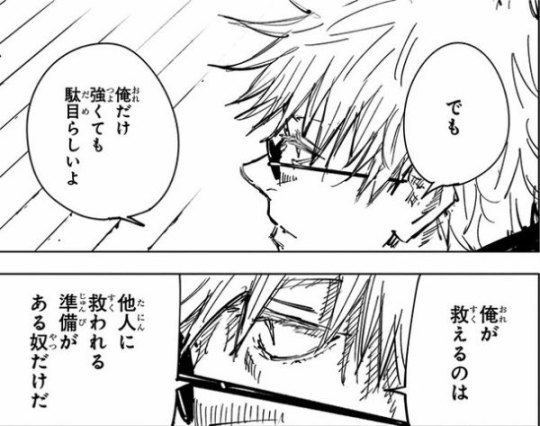
this is the full scene. the first panel is the question: 「俺だけ強くても駄目らしいよ」 and the second panel is 「俺が救えるのは他人に救われる準備がある奴だけだ」, so given this context, it's pretty clear what he's trying to say.
the second panel talks about how he can't save people who don't want to be saved. so, in conclusion, he basically means that his strength doesn't mean much if the person he's trying to save doesn't want to be saved.
#問 ━━ answers#guys my japanese is a mish-mash of slangs and junior high lingo#i am NOT a formal japanese speaker just a heads up#jujutsu kaisen#FREE ME FROM THE SHACKLES OF GOJO I DONT WANT HIM
5 notes
·
View notes
Note
I like that there’s actually a lot of nuance in Guilty Gear, but I also like that the nuance coexists with the first game ending on calling Sol the “Guilty Gear” which is a little cheesy.
On a surface level I’m like “Oh Daisuke, you silly goober, title dropping isn’t cool” but in the context of the moment it’s really good and I get chills thinking about it.
Yeah GG does have some really good nuance to it, somehow, despite being the series with stuff like a dimension called the Backyard and having giant biomecha WMDs rofl
I've always wondered if the "Guilty Gear" line in Missing Link was that blatant in the original Japanese version of the game or not, especially since the translations for Missing Link in general were a little rough around the edges. It is really cool how they worked the title in there though, even if it's something that might only be in the English version. Like, the words "guilty gear" on their own sound like complete nonsense but then you beat Justice and that line drops and it all suddenly makes sense.
#asks#When I first got into GG through Strive pretty much the first thing I did was try to figure out wtf the title of the game meant rofl#It was like a wild goose chase trying to understand what even just a Gear was hahaha#I was like 'so are they robots??? are they dragons????? Justice and Sol are the same species????'
40 notes
·
View notes
Text
Just sent someone an ask asking their thoughts on hnk translations and I have OPINIONS
Bortz vs Bort is pretty clear to me it's just Bort. The name of the gem irl is Bort. Some mf making a sub (or maybe dub too idk I haven't heard it) heard the Japanese VAs say "ボルツ," which sounds like "bo-ru-tsu," and decided that their name is now Bortz. But that's like,, not the name lol its Bort. Tbf though googling Bortz comes up wiht a Wiktionary disambiguation page leading to Bort so like idk
---
Kongō vs Adamant is more of a question of translation vs localization. From the hnk wiki:
The kanji used in Kongo (金剛) is derived from the term Vajra, which means both "diamond" and "thunderbolt". A vajra is a symbol representing a force that is both indestructible and able to cut any substance (hence diamond), as well as unstoppable (hence thunderbolt).
So you can see where the word "Adamant" would come from this. The wiki page explains more on the origins of that word but you probably follow from here. While this is a good translation of the word in this context, Kongō isn't an adjective to be translated, it's his NAME! We don't translate characters named Yuki to Snow!
The argument here though is in lost meaning and intent. Kongō's name is such to carry the meaning (along with his figure) that he is one of great strength and formidability. The meaning of his name carries this through. It's like naming a character "Dr. Evil." The meaning of his name is that he's fucking evil. Or Dr. Eggman. He's shaped like an egg.
But this is about MY opinion, and MY opinion is that we should just use his name. I'm not really a fan of changing a character's name in a translation, even if meaning is lost, even in the name of localization. His name is Kongō and I like it that way.
---
And now for the PRONOUNCE! To my understanding, the Japanese language doesn't have gender-neutral pronouns, so the gems use words such as 'boku' and 'ore,' masculine terms, which double as being gender-neutral in languages lacking gender-neutral terms.
One manga translation interprets this as just using he/him pronouns for everyone. This just,, feels like it's missing the point. The gems really aren't that masculine and calling them all 'he' doesn't feel right.
Another translation uses they/them. I like this a lot better. They're all intended to be genderless after all.
But I think the individual gems are more nuanced than that. Diamond and Red Beryl for example are obviously super feminine, there's no argument there and I feel comfortable calling them she. Even the less hyperfem gems like Bort or Cinnabar don't feel androgynous enough to warrant more than a she/her. But we also have gems like Phos and Antarc, who totally feel a they/them and Antarc maybe even a they/he.
Ghost/Caringorm are my favorites to explore this with though. They're just a big trans allegory. Ghost feels feminine, but this "other person inside her" is too gender to be left alone. And when the outer shell is forcibly shredded away from Caringorm (in a really gruesome scene might I add), a much more masculine entity emerges, one that has always been there, fighting for control the whole time. Sound familiar? It's trans as fuck!
But even then Caringorm doesn't feel all the way he/him! They're like a he/they/she with how they act with Aechmea, solidly genderfluid in my eyes.
---
But that's just a the- my thoughts! I'd love to hear someone else's input on this too
7 notes
·
View notes
Text
if u watch utsukushii kare, pls consider following @lollipopsub and (re)watching the series w/ their sub!!!
as some of u might know, i understand japanese to a certain level as im studying japanese and currently living in jp... and bcs of this, the engsub for utsukushii kare doesn't make sense to me at time bcs i understand enough japanese to realize that the original dialogue and the engsub are different (at times, not always)
the original engsub is good... as in it serves it purpose to tell the story in another language. it conveys the meaning of the dialogue just fine but it lacks all the character nuance so u're actually missing out on quite a lot from just the sub.
there's so many layers to Hira and Kiyoi in their spoken words and those side of them don't shine thru in the engsub!!!
it's so frustrating and that's why im so overjoyed to discover @lollipopsub !!! their sub of utsukushii kare stays true to the original japanese dialogue and they even include translation notes to explain things further asfghjkldi
PLEASE FOLLOW AND REWATCH THE SERIES WITH THE SUB BY @lollipopsub PLEASE I BEG U THE ORIGINAL DIALOGUE IS *CHEF'S KISS* AMD SHOULD BE UNDERSTOOD IN ITS FULL GLORY
(also im a language snob who thinks English is a bit bland compared to all the other languages i know rip sorry not sorry so any sub that are near identical to the original will always be my fav huhu)
123 notes
·
View notes
Text
Japanese vs. English Dabi - A 292 Comparison
As other people have already pointed it, the official translation is sometimes a little biased to the point of adding things into the text that aren’t in the original Japanese version or changing phrases to the point where the villains come off colder than they actually are.
The current chapters are highly important to Dabi’s and Shouto’s characters and so the official translation, unfortunately, can lead to people getting the wrong image of Dabi. This is not to say that Dabi is actually a super friendly guy - however, I don’t think you can get a full picture of all the layers to his character without taking the original text in mind.
Since there are a few panels I’m going to talk about from this chapter - comparing the Japanese version with the official translation and also dissecting and explaining the original Japanese phrases - I’m going to put the rest of this post under the cut because it’s a bit lengthy otherwise.
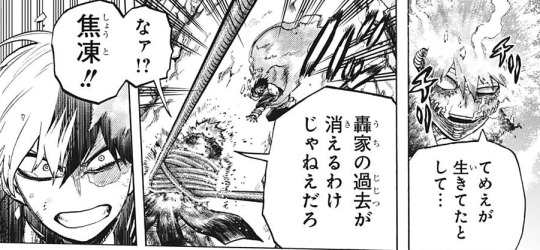
Let’s start with these panels. Though these aren’t mistranslated per se, just like with the “dance with your son in hell” line from the previous chapter, the furigana next to the kanji have a different meaning here. As discussed before, whenever this is the case, the furigana are what the character says, and the kanji represent what the character actually means.
The line in the second panel is: 「轟家の過去が消えるわけじゃねえだろ。」
轟家 「とどろきいえ ; todoroki ie 」-> the Todoroki household
の 「 no 」-> particle to indicate possession, works like an apostrophe
過去 「かこ ; kako 」 -> the past; a past (i.e. a personal history one would prefer remained secret); one’s past
が 「 ga 」 -> particle to mark the subject of the sentence
消える 「きえる ; kieru 」 -> to vanish; to disappear
わけじゃねえ 「 wakejanee 」 -> It doesn’t mean that
だろ 「 daro 」 -> right ? (used to ask the person you’re talking to for confirmation)
The two words that have a different furigana reading than they should have, are Todoroki household and past. According to the furigana, Dabi says:
「 うち 」-> house; one’s own home
「 じじつ 」-> truth; reality
So going by the kanji reading you get:
“This doesn’t mean that the past of the Todoroki household just disappears, right?”
Whereas what he actually says is:
“This doesn’t mean the truth of our home just disappears, right?”
In comparison to the “dance with your son in hell” line, these two versions don’t differ as much from another. Caleb actually addresses this in his twitter threat and sort of mixed the two versions into one: “This doesn’t change the hard truths about my family’s past!”
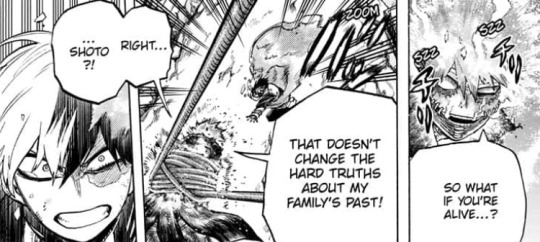
Personally, considering he is directly talking to Shouto here, I find the choice of translating the Todoroki household/home part into “my family” a bit weird. Since he seeks Shouto’s confirmation here, it would make more sense to translate it as “our family” in my opinion. The “my” makes it feel a lot more self-centered, even though there is no indication for him to only be referring to himself here.
Switching the word to vanish with “change” also slightly changes the meaning here. Though both are accurate, I feel like their past disappearing holds more weight. The line is, after all, referring to the fact that Best Jeanist has appeared, despite Dabi earlier announcing that the hero had been killed. So even though Dabi was wrong about that part, it doesn’t make his other facts go away. It’s not just about changing his words, but making it like they were never spoken in the first place. It’s a small difference, but a difference nonetheless.
Finally, the “hard truths” part instead of reality/past. It’s interesting to think about why Dabi says “truth” when he means “past”. But I think one way to look at it is that to Dabi, he has accepted the past. He has lived with it and carried it with him in silence for so long, but was always aware of it. Despite him not having told anyone else about it, he didn’t deny that past to himself. He shows his scars and he fights back. That is who Dabi is as the person that rose from Touya’s ashes. Meanwhile, he says “truth” while talking to Shouto. While we, the readers, and those around Shouto know of his hatred towards Endeavor, Dabi doesn’t know about this. To him, Shouto really is just Endeavor’s little doll. And so in Dabi’s eyes, Shouto has yet to see the truth. To acknowledge their past and the pain they all went through. And though Dabi might not be completely right about Shouto, he isn’t entirely wrong, either. Because even when Shouto hates Endeavor, even when he says he is just going to use him for his own gain, at the end of the day, regardless of his reasons, his actions are still what Endeavor wants him to do - to train hard and want to become the Number One Hero.
I included one the alternative meanings “a personal past one might prefer remained secret” because it also fits well with that interpretation. That the true meaning behind him saying “truth” is not just the mere past, but the part of the past they don’t want to share. Whether that’s because it’s an ugly one that could haunt them for the rest of their lives, or because it’s just difficult to talk about. Either way, it’s more than just memories from when their family was still young. In that, I think “hard truth” is actually a fitting translation, even when it doesn’t have the exact same nuance as the Japanese version.
While Shouto and Dabi are in many ways similar to another, they have slightly different goals: While Dabi wants to kill Endeavor, Shouto wants to save his mom. To both of them that is liberty, just with a different approach.
And the ending of the sentence, where he seeks confirmation from Shouto, sort of indicates just that. He wants Shouto to admit it. Pushing him into a corner and asking a question that only has one right answer. This is also similar to a few chapters ago when Toga confronted Uraraka with the question “Was Jin not a person?” It’s asking something with an obvious answer, yet the people being asked seem to not yet be able to give the right answer, even when they might already know it.

Next of, Shouto confronts Dabi about the villain he sent to their house, who could have killed Natsuo. As you can see in the panel above, the English translation has Dabi say: “Almost killed? What a shame. That would’ve really hurt Endeavor.”

Meanwhile, the Japanese version says: 「それならそれで。エンデヴァーが苦しむ。」
「それならそれで ; sorenara sorede 」 -> even so (expression frustration); still
「 エンデヴァー ; Endebā 」 -> Endeavor
「 が ; ga 」 -> particle to mark the subject of the sentence
「 苦しむ ; kurushimu 」 -> to suffer
As you can see, “Almost killed? What a shame” is kind of very far off from the actual meaning. While the official translation makes it almost sound like Dabi is disappointed and wants Natsuo to be killed, the fan translation has him say: “Then that would mean Endeavor would suffer.” This is a lot closer to the Japanese version and focuses on the more important part: the goal is for Endeavor to suffer. Dabi’s intention isn’t to get anyone else in the family hurt/killed in the process, however, he does have this tunnel vision where everything is about Endeavor and doing whatever to hurt him.
“What a shame” sounds like he is upset Natsuo didn’t actually die. While, as stated above, the first part can show frustration, that frustration more likely refers to the disappointment that Endeavor doesn’t suffer as much as he could.
While both versions translate the second part as Endeavor “would” suffer/be hurt by this, the Japanese uses the present tense for suffering. In a way, Dabi is saying “Well, though he could’ve been more hurt, he suffers.” Maybe he hasn’t been as damaged as could be, but it doesn’t matter, because the fact remains that he does suffer from this, present tense. So Dabi doesn’t recognize this as a loss or “a shame” that Natsuo didn’t die. Instead, he recognizes that Endeavor suffers, even when he isn’t met with the worst-case scenario.
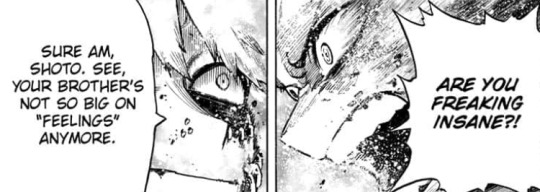
In response to the last panel, Shouto asks whether Dabi is insane (please don’t ask people that) and Dabi’s response in the original translation is “Sure am, Shouto. See, your brother’s not so big on “feelings” anymore.”
A couple of thoughts on this. First, this is a downgrade in comparison to the fan translation of “You got it, Shouto! Your big brother has completely lost any feeling for anything!”
Something the phrasing coupled with Dabi’s wide eyes and big smile make me laugh and this panel now lives rent free in my head.
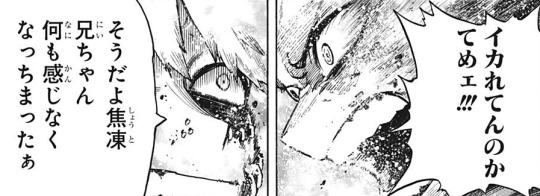
Anyway, the Japanese line goes: 「そうだよ焦凍兄ちゃん何も感じなくなっちまった。」
「そうだよ ; soudayo 」 -> that is right
「 焦凍 ; Shouto 」 -> Shouto
「 兄ちゃん ; Nii-Chan 」 -> big bro (in a very endearing way, but can also be used to be demeaning)
「 何も ; nanimo 」 -> nothing
「 感じ ; kanji 」 -> feeling
「 なく ; naku 」 -> adverbial form of nai; attaches to a verb to mean “without”
「 なっちまった ; nacchimatta 」 -> to have become (unintentionally; regretfully)
The fan translation, in my opinion, is far more accurate, but there is still something missing.
First of all, I don’t know why the official translation put feelings in quotes as if Dabi didn’t actually say it? mean it? It just feels like an odd choice that I can’t find a good enough justification for.
Second of all, “not so big on ‘feelings’ anymore” and “has completely lost any feeling for anything” is a big difference, and would make sense if the fan translation was inaccurate. But it isn’t. The official translation makes it sound like Dabi more or less chose not to feel anymore or pay attention to his feelings. He could, but he doesn’t want to. You could argue that both sentences still carry the same meaning: Dabi doesn’t feel anymore. "To be big on something” usually refers to having a strong interest in something and prioritizing said interest, which implies that one chooses to prioritize it. While I’m not arguing that some people do choose to ignore their feelings instead of confronting them, in this case, it’s actually the opposite of what he says.
Looking at the actual Japanese sentence, it begins with Dabi confirming Shouto’s words. Yes, I am crazy. There is no denying, nor shame in this. There is almost a bit of pride in that - so little bro actually recognizes that I have gone crazy from this.
Nii-Chan is an interesting choice of words here. The Japanese language is very much based on hierarchy. There are different levels of formality (shown through words, expressions, and verb forms) depending on whom you are speaking to. To summarize: When you are talking to someone who is of higher status (based on job position, age, experience). This also applies to siblings. Since those of higher status can be more direct/less formal with those of lower status, older siblings can address their younger siblings by their given name alone.
Meanwhile, the younger siblings would use some kind of honorific/suffix. In this case, the “Nii” means older brother. “San” is the standard suffix you would use to address your older siblings (and other people in general). “Chan” is a suffix that you usually use for kids/girls, - where it has a cute, endearing connotation - wherefore it becomes kind of rude when used for older people (as in people who aren’t children anymore). But it can also show endearment - a close bond between the siblings.
So why does Dabi call himself “Nii-Chan”? While you can interpret this as a sarcastic remark to mock their non-existent relationship, I think here Dabi uses it here to humanize himself to Shouto. Kind of like an “I know you see me as a villain right now, but I also am your bro, remember?” He isn’t just this “evil criminal” - rather cute lil Touya is still inside of him. Dabi isn’t just Dabi. He still is Touya, too. So if you fight Dabi and if you call Dabi insane, you also do those things to Touya. Dabi might be the stage of “having completely lost it” but that doesn’t just suddenly happen. It’s a process. While we can say Dabi became Touya on the day Touya “died” yet it’s important to recognize that there was a gradual transition where both Touya and Dabi existed.
Now that we have that part aside, let’s focus on the actual point of that phrase. The part about his feelings.
何も感じなくなっちまった。 Nanimo kanjinaku nacchimatta.
“Nanimo” means nothing and comes with negative verbs that it refers to.
As mentioned before, “kanji” means feeling and is paired with the adverbial form of “nai” - “naku” which negates “kanji” to turn it into not feeling. Pair that with “nanimo” and you get a meaning of “feeling nothing”
Now for the actually interesting part of this phrase (apologies that it took so long) - “nacchimatta”. This word consists of two seperate words: “naru” and “chimatta”. “Naru” means to become and is here merged with “chimatta” which is the colloquial past tense version of “teshimau”. The verb “shimau” expresses that an action (the verb it attaches to) has happened either unintentionally or has yielded regrettable results. So in this case, it is unintentional/regrettable that he has become something.
Putting this together, Dabi says that he has turned into someone who doesn’t feel anything anymore and this was not his intention, nor is it a good thing. To be fair, “shimau” can also mean something happens completely, however this meaning is rarer and while we can say that this is the meaning here, it’s more likely and more interesting to consider the more common meaning.
With that in mind, I want to quickly address the panel next to it, where Shouto asks him whether he has gone insane
In Japanese Shouto says:「イカれてんのかてめェ!」
「イカれて ; ikarete 」 -> (*ika is written in katakana here to emphasize the word since you can’t use italics in Japanese) to be beaten; to be crazy
「 ん ; n 」 -> ender is used when explaining something; often with emotion*
「 の ; no 」 -> explanatory particle; used at the end of a sentence like a question marker, but you want the listener to answer and give you the reasons why
「 か ; ka 」 -> ender indicating doubt or uncertainty
「 てめェ!; temee! 」 -> you (derogatory) *meme not intended
The reason why these nuances are important to take into account is that when Dabi, in his reply confirms that “Yes, you’re right, unfortunately, I have become unable to feel anything” he is not just confirming the statement, but emphasizing just how tragic this all is.
*[edit because someone pointed this out to me: the ん here is actually more likely to be the casual form of いる (iru) that attaches to the て (te) form of a verb to turn it into the current/ongoing state (= In this case "are you being crazy).]
The official translation simply made Shouto say: “Are you freaking insane?!” which isn’t exactly wrong but misses the nuance of the “nnoka” in the middle of the sentence. While the official translation sounds rather cold and dismissive, the original shows that Shouto cares. There is emotion, and more importantly: there is a desire to hear his reasons. “Why do you think it was okay to put Natsuo in danger?” By the way, the “n” ender that shows emotion when explaining something is also used by Shouto earlier when he says “Remember him? The brother you cried to every day?!” - It’s no surprise that he is emotional right now, still, it’s important to note that he isn’t just showing his emotions through his tone or his expression, but also through his words in order to make it as clear as possible to Dabi how much Dabi’s actions affect the rest of them and hopefully be able to get through to it.
It’s an emotional and tragic conversation that takes place between them, yet the official translation turned it into a much colder, less-caring one.
I know this was a lengthy post with a lot of information, so congrats and thank you if you’ve made it this far. The reason why I decided to make this post was that initially, the “Nii-Chan can’t feel anything anymore” part stuck with me so much and even more so when I dissected it.
Again, other people have pointed out that the official translation is very biased at times, which is not just sad for those of us who care about the villains, but it’s also just not professional. A lot of the panels I talked about in this post aren’t inherently incorrect, they are simply missing nuances that the English language doesn’t provide. Still, I wished that a professional translator would figure out a way to at least slightly incorporate these anyhow (which btw is literally part of the job). Aside from those, it’s just frustrating when the emotions get almost entirely removed from phrases. I get it - Dabi is apathetic, as he says himself. And yet, Dabi is also constantly shown to put extreme care into which words he chooses; this chapter being no exception. So why does such an important conversation between two brothers get changed in ways that make people who don’t bother checking other translations/the Japanese version unable to get the right image of them?
I understand that it’s important to support the official translation and I do. But it’s also very much important to read other versions, too. While the fan translation might have errors and mistranslations in it here and there, it tends to be a bit more literal and thus includes the nuances more than the official translation does. So please don’t just read the official translation and treat it like the only valid one, when it also comes with its flaws and just isn’t a good sole source for when you want to understand the characters.
#dabi#meta#bnha#boku no hero academia#shouto#todoroki#292#my hero academia#mha#mine#bnha 292#lov#also this took a while pls show this some love sgnskgns#translation
2K notes
·
View notes
Text
Is Gen gay-coded or just an entertainer? ¯\_(ツ)_/¯ random thoughts/observations about his speech in Japanese
Warnings: LONG. mentions of gendered language and homophobic characterizations
The concept of “role language” is super important in Japanese fiction, because how a character talks can tell you a lot about their personality. Unfortunately, it’s often lost in translation because languages like English don’t have the ability to play around with formality levels, pronouns, etc as much.
Ever since I first watched the dcst anime like a year and a half ago, I’ve had no idea if Gen is intended to be the “gay friend” character or just the “quirky famous guy,” or maybe both? I figured that writing out my thoughts might be interesting for some people! Take everything with a grain of salt tho since I’m not a native speaker
1. Backwards speech
I want to first cover backwards speech (localized as pig latin in the English manga) because this used to confuse the fuck out of me. It felt like a quirky teen thing or internet slang, but it’s actually [zuuja-go] (“jazz” written backwards + “language”) which originated in the 40s-50s.
It was revived primarily by male TV stars and comedians in the 80s-90s, and to this day zuuja-go is regarded as a type of [entertainment industry-specific language]. However, it’s hardly used anymore. It’s kinda weird then that Gen, who’s too young to have lived in the revival period, would use zuuja-go, but my guess is that it’s a funny and somewhat original way to show his “popular entertainer” background. I personally don’t know any other characters who use it as regularly.
2. Choice of pronoun + speech patterns
Gen ends nearly every sentence with ~ne, ~yo ne, ~yo, or ~sa, or otherwise no particle at all. Questions almost never have an ending emphasis particle, putting the rise in intonation on the final word (the standard is to end with ~ka, ~no ka, etc). He also always contracts the verb ending ~te shimau into ~chau/jau (Senku always uses the contracted form too, but a more boyish derivative (chimau). It probably sounds crazy but trust me). There’s more I could list, but these are the most notable points lol
This kind of speech pattern is associated with teen girls/young women, so when it’s applied to a perceived male character, it’s used to indicate that they’re an “effeminate man”. In most cases, “effeminate” = gay/trans (yeah it’s shitty and outdated thinking). It’s also been applied to male characters who are idols or internet stars, possibly as a dig at their masculinity or making fun of their attempt to appeal to female audiences.
One example of the latter is Pyotr from Carole & Tuesday, who’s their universe’s equivalent of an Instagram celebrity. His sentence structure is almost identical to Gen’s, with the girlishness turned up to 11 because of the very high pitched, nasal-y voice given to him in the show. More on this later.
We also can’t forget how he calls everyone -chan. It’s diminutive and cute, but literally no one uses -chan that much. Even in fiction, female characters normally use it for female friends or children, and guys almost never use it except for children and maybe certain girls they’re close with. It’s definitely the most exaggerated cutesy trait he has. “Effeminate male” characters often address others - regardless of gender - with diminutive honorifics or cute nicknames even when not necessarily appropriate, so this is just gay-coded behavior from what I can tell lmao
One thing that’s different about Gen compared to other characters with the same "effeminate male” speech pattern (that I can recall, at least) is his pronoun. He uses the masculine “ore”, like Senku, Chrome, and most of the other young male characters. In text, his “ore” is even in kanji (俺) like theirs. Had it been written in hiragana or katakana, it would have given more of a casual or stylish vibe. Just as a sidenote, this is also why his name itself is written in mixed hiragana/katakana instead of kanji! It’s a typical thing for Japanese celebrities to do with their names to seem cool.
Anyway, characters who are meant to be portrayed as “effeminate men” will almost always use watashi or atashi, the standard “female” pronouns, or at least “boku” which is generally male-aligned but softer than “ore” (Pyotr uses boku, as an example).
Pronoun usage is way more nuanced in real life, but for fictional characters, it tends to be broken down into these kinds of stereotypes based on Tokyo-dialect Japanese.
He also is missing some other key points in his speech pattern that would more clearly identify him as gay/trans-coded, like using the feminine ~kashira (”I wonder...”) instead of ~kana.
3. Voice acting in the show
I love Gen’s Jpn voice honestly, but it does play into the “effeminate man” stereotype a little. His voice is a bit higher pitched than the other guys and somewhat nasal-y, which are both common traits of this stereotype when used with the speech patterns I talked about above. The way certain syllables are stressed also highlights his feminine speech pattern. However, he’s comparably tame to “effeminate” characters in other series. For example, his Jpn voice actor does raise the pitch of his natural voice for Gen, but it’s not a falsetto imo. It’s pretty common for male voice actors to do falsettos for “effeminate” characters.
Gen also doesn’t fall under a lot of the tropes that plague many gay/trans-coded characters and quirky celebrity types - such as being a “diva” or uncomfortably flirtatious - which tend to get amplified in voice acting.
---
This stuff combined with my previous post about his clothes makes me wonder even more about what was intended for his character. There’s a lot about him that is notably “feminine” without him leaning too hard into gay stereotype territory. And it’s just like, why did you do that.
If you survived reading this far, I’d love to hear your thoughts<3
#gen related rambling#dr stone#dcst#asagiri gen#yeah i'm back on my bs baby!!!!#been sitting on this for a little while so i hope yall enjoy
83 notes
·
View notes
Text
MVA In Memoriam (4/5)
The Comprehensive Account of the Butchering of My Villain Academia
(Introduction and Part One, Episode 108: My Villain Academia)
(Part Two, Episode 109: Revival Party)
(Part Three, Episode 110: Sad Man's Parade)
Part Four, Episode 111: Origin: Shimura Tenko
Chapter 233 – Bright Future
• Twice clearly having arranged a Skeptic puppet to where its arm can be used as a pillow for Toga’s neck. A cute little character detail while also being kind of disturbing? Very on-brand for the League! A not-immediately-plot-crucial visual of a member of the League demonstrating obvious care for another member? The guillotine awaits!
• A little explanation about how clones’ physicality and memories work relative to the last time Twice saw the people the clones are based on. This is a very useful little nod of explanation to something that remained unclear from the dialogue of Mr. Clone-press last chapter. Twice’s quirk is pretty arcane in its ins and outs, frankly, and the clearer those details are, the fewer plot holes you’re leaving for later.
• The scene of Skeptic being right on the verge of confronting Twice. Skeptic has, oh, about five moments where he’s obviously a big tense neurotic who’s unpleasant to be around if things aren’t going his way, and the anime deleted or downplayed all but two of them. As ever, it’s obscenely damaging to the characterization of the MLA cast, who we have little enough time with as it is. Further, it was a particularly weird choice to make with Skeptic, who is as of this writing the only major MLA character who’ll emerge still free and active from the War Arc. Why shaft the characterization of the one of new characters who’s going to be getting the most attention out of any of them in the next arc, with yet more scenes yet to come after?[1]
• A full page’s-worth of Spinner’s rationalizations on targeting Trumpet and ordering the Twice doubles to do the same. This lays out the details on why targeting Trumpet stands to relieve some of the load on Shigaraki. It isn’t because Trumpet’s quirk makes the crowds more dangerous, though that is true. Spinner targets Trumpet because he’s seen enough to know that attacking the MLA’s leaders gets them crazy riled up; he knows that if he makes himself a threat to Trumpet, then all Trumpet’s followers’ attention will shift focus to Spinner, leaving Shigaraki with less to deal with.
Spinner also knows that that is ludicrously dangerous to him personally, given his weak quirk, but he actively makes that choice anyway, because that’s how much he’s devoted himself to Shigaraki without (yet) quite articulating the nature and reasons for that devotion. Targeting Trumpet without any of that reasoning made for a perfectly sound tactical decision, but it missed the regard Spinner shows the unnamed mobs of the MLA, and it really missed the probable savage beatdown and even possible death that Spinner consciously chooses to risk for Shigaraki’s sake.
Of course, a chunk of what the episode deleted is flashbacks to scenes the anime also cut, so they couldn’t figure into Anime!Spinner’s reasoning. This does not excuse yet more cuts to Spinner’s arc and characterization; it only adds to how badly the anime maimed him.
Also, on a less salty but still confused note, deleting all the Twice clones from the beginning of the scene and just having Spinner running along a wall past mobs of people instead of laboriously fighting his way through the street to the van was really dumb. Why did all those MLA people just stand there and let him run by? Where did all the Twice clones that just helped save Spinner from a huge flurry of long-distance attacks disappear to? Come on.
• Trumpet’s thought that using Sevens Loud will draw every bit of strength from their warriors, but that it’s necessary. Setting aside that it looks far less necessary when there hasn’t been a crowd of Twice clones fighting Trumpet’s people this whole time, just Spinner by his lonesome, we still lost quite a bit to this cut. Firstly, a nuance on the trade-off Incite gives—that its stat-boost is temporary, and that it’s borrowing from the future to pay for the present, a stock that is limited and a bill that will come due when the effect wears off.
Secondly, it’s another demonstration that the MLA leaders aren’t just thoughtlessly wasting their followers’ lives; they’re very consciously doing cost/benefit analysis on how much danger their people are in versus what stands to be gained by the potential exertion or outright deaths those people will suffer. It’s cold reasoning, yes, but that’s how the Liberation Army operates: not for the personal gain or lackadaisical ease of the people on top—Trumpet would just have been in the tower speaking through city-wide loudspeakers, if that were the case—but for the advancement of the group’s ideals.
It also just grants Trumpet some interiority, but of course the anime can’t have that.
• The note in Trumpet’s meta-ability explanation that the more his voice causes the air to vibrate, the stronger Incite’s effect. This is—good god, it is literally the entire design mentality behind Sevens Loud! Sevens Loud purpose isn't to make his voice louder so more people can hear him (which I would think is the most logical assumption an anime-only person would make as to why he puts it on); it’s to make himself louder because being louder enhances the boost. It’s about the quality of the effect, not the quantity of targets. This is why Trumpet has the thought about how using Sevens Loud will drain the strength reserves of his people. There’d be no correlation there if Sevens Loud were only about boosting his range.
• When Spinner got porcupined in the anime, they did a close-up on his face, possibly to avoid the gore of showing the spines piercing through his forearm. That’s fine, but they also emphasized the reaction by having him lose his grip on the huge fuck-off knife he had clutched in his teeth. In the manga, sure, he yells in pain, but he doesn’t lose the knife. Indeed, he gets the guy off him by slashing at him with it—a shot the anime dropped. So Spinner doesn’t even get to keep displays of his pain tolerance, a trait he doubtless improved during those six weeks against Machia. Why does the anime hate Spinner so much, you guys? Why did it go out of its way to make him look lamer, when Dabi and Toga were out there getting anime-original flourishes to make them look cooler?
• Spinner’s thoughts, “When I get inspired to act, I don’t know what the heck I’m doing! I’m just a loser jumping on a bandwagon. Or at least that’s what it looks like.” A humorous bit of self-awareness from Spinner here. The anime got at the self-awareness. The humor, as we’ll see, not so much.
• Spinner’s thoughts, “Look at me. Look at me!! With all that prejudice in your eyes!” Hah hah, laughed BNHA the anime nervously, what prejudice are you talking about, Spinner? No idea what you could possibly be referring to there! This one’s particularly annoying because, while one might think that the anime was just dodging the heteromorphobia angle it eradicated all references to back at the beginning of the arc, the prejudice line isn’t even about heteromorphobia, not really.
See, the Japanese line there literally translates to, “With those colored glasses!”—to see with colored glasses being a Japanese idiom for seeing something from a biased viewpoint. So aside from being a wordplay jab at Trumpet’s choice in eyewear, it’s also about Trumpet’s expressed view that Spinner, having been a shut-in with a weak quirk who decided to take his resentment out on the world, can’t possibly amount to anything much. So, what, did the people in charge of making those cuts think Trumpet was right? Why even keep the line where he disparages Spinner if you’re not going to let Spinner call it what it is? He’s not calling out fantasy racism there, anime! He’s calling out the bias against weak quirks that even the good guys in this world sometimes partake in!
Possibly it’s because non-villains in the world[2] sometimes use reasoning that leads logically to quirk supremacism that the anime got gunshy with it, or it was more reluctance to give the villains—and the Too-Real Iguchi Shuuichi especially—moral ground for accusations against their society that get too close to real life. Whatever the motivation, it’s a bullshit cut.
• Shigaraki calling RD “Detnerat,” presumably because he neither knows RD’s real name nor cares to dignify him by using his code name. The anime, again, made neither the connection nor Shigaraki’s recognition explicit, so it lost the specificity and pettiness of that little snub.
• A little exchange between Giran and a Twice clone as they flee. It doesn’t give you much you wouldn’t assume just from seeing them flee, but it always feels more immediate and empathetic when the characters talk and you can see their expressions, instead of just a quick shot of them from behind as they run away in complete silence. Heck, running away in complete silence is actively out of character for Twice!
• Because the anime has some kind of aversion/restriction on showing hand-related violence, it radically changed how Shigaraki lost his fingers,[3] resulting in the loss of several important shots. To the best of my parsing, in the manga, when Re-Destro makes that first big jump to avoid Shigaraki’s decay wave, he comes back down specifically aiming for Shigaraki’s outstretched left hand, spread wide and flat on the ground. Shigaraki tries to evade (you can see the blur of his left arm in the panel where RD lands), but either RD does manage to clip the hand or he simply hits the ground with so much force that the sheer explosive burst of rock shreds Shigaraki’s hand and part of his coat sleeve. Being so much larger, RD then simply snags Shigaraki by the wrist before he can get out of range. It’s very fast, a burst of speed and violence, and very different (read: cooler) from Shigaraki flipping end over end in slow motion in a way that seemed to imply visually that he was thrown well out of RD’s grabbing range.
As to the shots we lost? I counted three. First, Hana’s hand crumpling amidst all the flying debris. Second, that big dramatic panel of Shigaraki’s maimed hand ribboning blood into the air as the narration box finally drops Re-Destro’s identity and code name. Third, the shot of him catching Shigaraki, almost delicately, between one thumb and forefinger and delivering the, “Was it this hand that committed such evil acts?” line—a clear threat to what of that hand Shigaraki has remaining—as we find out what his meta-ability is.
This is all hugely dramatic in the manga, because, of course, readers always assumed Shigaraki needed all five fingers to activate his quirk, and here Re-Destro nigh-effortlessly robs him of fully half his capacity to use it. It’s a shocking turn-around and instantly ups RD’s threat level by allowing him to permanently maim Shigaraki in a way that no one, hero or villain, has done before or since. Robbing Re-Destro of the immediacy of that seemingly devastating blow—inflicted within moments of meeting the real Shigaraki—did immeasurable damage to his credibility as an arc boss.
The shot in the manga is also just arresting visually, with RD finally getting to properly loom over Shigaraki. Most of the shots up to this point have been framed such that, while RD is obviously bigger, he and Shigaraki have still been moving and fighting in a pretty level way. This is the first place where the viewer is situated so squarely behind Shigaraki that they can really feel how massive RD is in comparison. It’s certainly a more impressive visual than this mess—thanks, anime; thanks, whatever broadcasting standards forced overworked and uninspired animators to undertake a redraw of RD’s quirk reveal panel when every other member of the MLA brass had theirs carried over directly from the manga.
• A chapter-ending cliffhanger of Slidin’ Go helping direct traffic on the outskirts of Deika and the warning rumble as Gigantomachia approaches. Aside from being a nice little tension boost—Will Gigantomachia roll up just in time to see Re-Destro making a mess of Shigaraki? Who will he target? Will Shigaraki ever be able to win him over if he sees a scene like that?—it’s good foreshadowing for what the news reports will eventually be saying. Remember, the claim is that a bunch of villains lured Deika’s heroes away and then attacked the city while it was defenseless; that’s why we never see any of the MLA’s heroes involved with the fight once it starts. And now, here, we find out where they’ve been the whole time: making sure no outsiders get in who might be able to undermine that narrative.
Framing Shifts
• Once again had an MLA member using their Detnerat item say its name out loud, when it’s clear in the manga that they’re just thinking the names internally. Once again, it was kind of silly.
• When Spinner flashes back to watching Stain on TV and being inspired, the manga uses a shot of Stain’s face, snarling and defiant. The anime used—a shot of Stain from behind, only visible from the shoulders to the knees, hunched so that his lower back and ass were towards the camera. Bones… What exactly were you implying lit Spinner’s fire there? Or did you just not have the time or budget to go pull Stain’s reference sheets for drawing his face?
• A tone issue, but a major one: Spinner should be grinning, face alight with accusatory challenge, as he hurls his accusations of the MLA/Trumpet being the same bandwagon-jumping nobodies that he is. This is the moment in the manga where we see Spinner truly throw his hesitations and his doubts to the wind and embrace Shigaraki’s nihilistic fervor and the beauty, value and profundity of emptiness. So what if I’m empty? So what if he wants emptiness? Who cares about other peoples’ ideals if their ideals leave no room for me? It’s not a heroic triumph, but it’s a triumph all the same, and losing Spinner’s smile made the moment far too bitter.
• Meanwhile, in exactly the opposite problem, Shigaraki by this point is not smiling. In fact, he’s barely on his feet, swaying violently in place with accompanying sound effects. While his words are openly mocking, he seems to wholly lack the energy to back them up with his usual verve. The anime didn’t have him smiling, admittedly, but the whole time the ‘camera’ wasn’t directly on his face, his voice actor was reading the lines with an uneven, chuckling cadence that suggested Shigaraki was seconds away from breaking into howls of laughter. He was also, of course, impossibly clean, at a point at which his manga counterpart is muddy, bloody and tattered from the horrifically extended combat he’s been living for six weeks. It’s stuff like this that made it so impossible to take the Army or even Machia as much of a threat in the anime, when, other than the red cords on his hands being broken, Shigaraki looked absolutely no different than usual.
Additions
• Gave Spinner a tiny bit of new animation when he got mobbed by people hopped up on Incite. It was nice, but if they were going to give him a flourish, I’d rather it have come when he swipes Porcupine Dude off him with a combat knife. Or, you know, just kept the bit of him telling the Twices to attack and his reasoning on why.
• Cut inside briefly to show a ballerina girl dancing through a darkened apartment right before she sliced a neat circle out of the wall. I love it, A+, exactly the kind of expansion on the action of the manga I wanted to see. My only complaint is that her manga self looked more like Pearl from Steven Universe.[4] XD
• A quick new shot of RD when Shigaraki was hounding him about his feelings. His teeth were visibly gritted, the corners of his mouth pulled down. It stands out because there’s only one shot of RD there in the manga, and in it, he’s smiling, close-mouthed and calm. The anime copied said shot, smile and all, then cut away, and when it cut back, Re-Destro had a totally different expression on his face. Baffling. Anime!RD having a dour scowl everywhere manga!RD is smiling in a tight, controlled way was all over the fight scene, and it detracted from the sense of RD’s menace every time.
Chapter 234 – Destruction Sense
• The illustration(s) accompanying Re-Destro’s, “Let’s not judge people by their quirks,” line. The pictures are cute, but the real loss there was the note informing us that they’re excerpts from a children’s book published by Shoowaysha—Curious’s outfit—called Quirks and Us. That’s a very concrete illustration of the kinds of things the MLA is getting up to in the world, and an equally concrete thing an anime-only viewer lost. Of course, that viewer never even found out Curious was in publishing, so it wouldn’t have meant anything on that front, but there is one other thing I think is notable: the way that book implies that the only people explicitly pushing a “don’t judge other people by their quirks” message are the radical Liberationists.
See, the rest of the story touches on the virtues of a nonjudgmental attitude here and there, but actually finding people willing to say it out loud is—unprecedented, I think. Deku comes across situations where he could say something like that multiple times and he never, ever does—not to Shouto, nor to Shinsou, nor to Eri, nor to the giant fox lady. And that’s not even touching on Shouji’s mask, or the discrimination Spinner faced, or the CRC “losing support” without being declared illegal. I think the manga itself is against judging people by their quirks, but it’s interesting that it doesn’t make its characters into mouthpieces to say as much. This is because its characters are thoroughly enmeshed in a society that very much does judge people by their quirks, regardless of whether or not it will say that doing so is bad or rude or prejudiced.
Re-Destro and the MLA aren’t immune, of course—Re-Destro himself says that quirks are linked to personality—but they adhere to a different set of values than the larger society does. While Hero Society talks about quirks in terms of being heroic and/or useful versus villainous and/or useless, the MLA spectrums instead emphasize how capable a person’s quirk is of helping them exert their will and how ambitious the quirk’s bearer is in that exertion. That is, their ethics are less about morality and utility-to-society than they are about aspiration and utility-to-self.[5] Both worldviews have their pros and cons, but that, I think, is what the children’s book is getting at when it says not to “judge”—don’t assign an arbitrary moral value to a quirk; judge a person by their actions.
And isn’t it interesting, that the only explicit verbal statement of that value comes from the leader of a radical cult descended from a famous insurrectionist quoting a children’s book published by a member of selfsame radical cult? The value is not ever stated by a member of the heroic cast, so are we to assume that the heroes don't actually believe it? Do people profess to believe it but everyone knows it’s only for courtesy’s sake, with only the MLA willing to breach that wall of “things we don’t talk about in polite society” to actually talk about it in anything other than platitudes? Obviously, you lose this entire line of discussion when the "don't judge people by their quirks" value is just never mentioned at all.
• The phrase, “In that case,” from RD’s, “You will never measure up to me.” It establishes continuity to what RD was saying before. He’s not taking breaks from talking while Shigaraki has flashbacks; the two are happening concurrently.
• RD’s, “Cracking apart…?” reaction to his Decayed fingertip, and the dripping blood from the injury. I’m not hugely fussed about the former, but I like the latter as indicative of what Re-Destro’s Stress powers actually do. That is to say, he isn’t covering himself in a thick shell of Stress power or something; his Stress powers make him physically larger, infusing his body and swelling his size. That’s why he bleeds when Shigaraki touches his fingertip.
Admittedly, the size distinction was more obvious in the anime, where the audience watched RD’s shoulders inflate like balloons last episode, compared to the manga, where you don’t get in-between animation. Still, given that RD still has that wound even when he goes back down to normal size, and is still wearing bandages for his speech a week later,[6] it’d be nice to mark the severity of the wound with a bit of blood. Oddly, the anime did keep the wound for the crater scene, visible red slices opened in the flesh along the length of his finger, very obviously the sort of injury that would have bled upon being first sustained. Maybe RD ran afoul of whatever the studio mandate is on when Decay has a dust effect and when it leaves gore? (More of that later.)
• Shigaraki’s, “Mother!” for the first panel we see of her. It’s obvious enough who she probably is, but odd that we got a whole bunch of narration for Hana, and likewise an acknowledgment of his grandparents, but not even a single word for Nao.
• Very significantly drops the grandfather’s, “Eating yummy things helps make the sadness go away.” Grandpa’s not just randomly handing Tenko his favorite snack in that memory—he’s trying to treat some kind of grief or wrong without actually addressing the wrong, opting to just put a flavorful band-aid on it. That could be fine if it were something outside Grandpa’s control, but we’ve already gotten some early hints from Hana’s phrasing that things are not okay in the household, and thus the grandfather’s attempt to bribe Tenko with sweets is just as ominous a sign of what’s to come as the grandmother’s attempt to guilt him into not crying lest he make her cry too.
• A little shot of Shigaraki stirring in the rubble when RD answers the phone. It’s a nice demonstration of their size difference, especially comparing both of them to Machia, who we just saw tearing through buildings like the kaiju his theme music declares him to be.
Framing Shifts
• When Shigaraki narrates that Hana always took him by the hand when he got weepy, she actually does take his hand in the manga, her fingers wrapped around his, his clasped over hers. It emphasizes that this is what he can’t do anymore, simply hold hands with people, the innocence lost aspect, and it suggests the closeness he once had with his sister.
In the anime, she reached out a hand but wound up taking him by the wrist instead, his hand splayed open beneath hers. This suggested, albeit very implicitly, that maybe that innocence was something he never had from the beginning; it also suggested less reciprocity in his relationship with Hana. Even though Tomura said in narration that their hands were joined, what we saw was that Hana just pulled him where she wanted him and he didn’t fight her on it, not that he held her hand in return.
Alternatively, the anime could have been drawing a parallel to how her hand would eventually be gripping his wrist in a much different context (a more necrotic one, for starters) later in life, though if that's what they were going for, they could have stood to tweak the dialogue so it actually matched the onscreen action. (Credit to @robotlesbianjavert and @aysall respectively for these two theories!)
• Shigaraki still having his fingers when Re-Destro squeezed his hand made RD look like a real moron. I assume the intention was that he assumed he’d done enough damage—broken bones, torn ligaments, etc—to prevent Shigaraki from being able to move his hand in more than spastic twitches, but like, if all it takes is a hard enough spasmodic clench to dust you, you are playing much riskier games than the MLA is generally portrayed as favoring. (Not that the anime kept many of the scenes that demonstrated all the planning and prep that the MLA did as groundwork for their attack, as I have complained about at length.)
In the same sequence, Anime!RD turned and bodily hurled Shigaraki away from him, while Manga!RD threw him a similar distance with nothing more than a flick of a finger. Anime, why you gotta make Re-Destro look so lame all the time?
Additions
• Just one episode prior, the anime managed to turn in an entirely reasonable assemblage of swiping and dodging between Shigaraki and Re-Destro while RD was rambling on about the Mother of Quirks. What the hell was the excuse for this episode’s ridiculous shot of Shigaraki literally running circles—big, broad circles—around RD multiple times in the time it took RD to finish one (1) thought? For heaven’s sake, if you don’t have the budget for flashy, just use slow motion or more flashback animation or something. I know there’s more leeway for long thoughts in manga, where the reader understands that thoughts are moving far faster than action, and that it can be hard to bridge that gap for anime, where motion is motion but voice acting still has to rattle its way to the end of a sentence. I understand that measures have to be taken to account for that. Still, I promise, something that just looks a bit padded is much preferable to something that looks outright dumb.
• I admit to having found huge Stress monster RD pulling out a teeeeeny-tiny cellphone very funny—even more so the distinct cracking sound it made when Skeptic reported in bad news and RD’s fingers tightened infinitesimally—but the manga suggests fairly strongly that RD’s just answering on some kind of earpiece or micro-receiver, the same kind of thing Ujiko hands out and that Skeptic is associated with on multiple occasions. It’d be nice if RD could have kept more of the jokes he actually makes, the ones that stem from his native good humor, rather than the anime making up new ones based entirely in the contrast of Re-Destro and the viewer’s expectations of Re-Destro.
Chapter 235 – Shimura Tenko: Origin
• The man at the door, whom Nao is apologizing to at the beginning of the Tenko flashback and the apparent reason Tenko got busted for playing hero. I don’t love the way deleting this obscured that Tenko, in some fashion, troubled someone to lead to Kotarou dragging him down the hall (the anime also dropped Kotarou’s subsequent line, “Causing trouble?!” that’s supposed to supplement his, “Playing hero again?”), but it’s not like the manga doesn’t imply that the same thing would happen for any hero-based rules infraction, regardless of whether it troubled strangers or not. No, the much, much funnier thing to me is how it just fuckin’ torpedoed the most obvious thing people point to when they posit that All For One gave Tenko Decay, kicking off the entire tragedy: the man at the door with the conspicuously shadowed face and the even more conspicuously AFO-like suit and dress shirt with the top button unfastened.
Listen, I hate that theory and what it would do to the narrative of Shigaraki Tomura/Shimura Tenko as Hero Society’s long-overdue reckoning, the villain they can’t put down and the victim they can’t silence, so watching the anime summarily cut out the scene that really kicked the theory into overdrive was very validating! Conversely, I still can't deny that it's a plausible theory, so if it does turn out to be true, that means the anime shot itself in the foot on the most obvious bit of foreshadowing this side of AFO addressing Tenko by name when he finds him in the alley. The schadenfreude of that would also be very funny. Really, unlike every other cut this season, I regard this one as win-win for my personal experience with the anime.
Incidentally, I was very prepared to complain about the anime dropping all the changes of clothes the Shimura family goes through over the course of the flashback—I regard the timelapse as one of the major points against the AFO Gave Tenko Decay theory, since it’s never taken a quirk bestowed by AFO multiple days, maybe even multiple weeks, to kick in before—but it turns out I’m a lot less bothered about them not taking the time to change the side characters’ clothes when the anime also deletes the dude at the door who is the only reason I care about clarity re: how much time the flashback covers! But just for the record, while they had more outfits than I was expecting them to, the family did go through fewer changes of clothes in the anime than in the manga.
• The full echo of the line about kids being sneaky and simple in favor of Narrator!Shigaraki just letting out this exhausted, rueful, “Ahhh, kids are…” I actually rather like it. It’s a clear reference back to the earlier line without having to restate the whole thing, and Uchiyama Kouki’s delivery is really excellent.
• Kotaro’s first slap of Tenko, the only one directly portrayed on-panel, and Mon-chan’s barking in response. On the one hand, I think there’s an argument to be made for the scene flowing a bit better like this—why wouldn’t Grandpa try to stop him from going for that second slap; why wouldn’t Nao pass Hana off to Grandma and do something instead of just standing there yelling for the entire scene? It makes a bit more sense if they’re hesitant to intervene because Kotarou has “only” grabbed at Tenko’s collar and they don’t yet know how that it’s going to escalate to naked physical violence in a way that it never has before.
On the other hand, that first slap is so visceral and shocking. Nowhere else in the manga is domestic violence portrayed more sharply and directly, in greater detail or more cruelly generous panel space than in this moment. It’s in the difference in size between Kotarou and Tenko, the force behind the hit that’s enough to knock Tenko clear off his feet, the pages upon pages of gut-churning lead-up to this moment and what we know will be following soon after.
Also too, it makes the family’s failure to help Tenko much worse that no one else acts when Kotarou pulls back for a second hit. The first one, you could almost excuse because no one saw it coming; the second throws those justifications out the window and spits on them afterward. Two hits are important—not only for what they tell Tenko in the moment about his family's inaction, but because two hits speak in ways one hit doesn't to how wildly uneven the power balance is in the house, that Nao and her parents could witness something like that and not only fail to intercede, but then take who knows how long to work up the courage to confront Kotarou afterwards.
I understand very well the fear of showing this in a family TV timeslot—the violence is so much more real than any big fantasy beat-‘em-up could ever be—but it’s the kind of thing that really drives home what Tenko needed to be saved from even back then, a social issue that heroes as they currently exist were in no position to address. Far from demonstrating that heroes aren't at fault for what happened to Tenko, though, what this scene truly does is vividly illustrate the flaws in All Might's social contract, in which his power and smile seem to promise that he can save absolutely everyone, only to leave children like Tenko out in the cold with no explanation as to why. It's brutal because it has to be, and the anime shying away from depicting Kotarou's physical abuse undercut that.
Framing Shifts
• There was a bizarre, nonsensical change to the scene at the beginning of the chapter where RD is figuring out how Shigaraki survived/got back up after taking a Burden attack head-on. The manga’s explanation is that Shigaraki didn’t actually take a full force hit because he was Decaying it even as it was blowing him back. This is somewhat silly, given that even a reduced-strength Burden is still strong enough to put him through multiple buildings. It is, however, less silly than the anime’s take, in which Shigaraki touched Re-Destro rather than the corporealized Stress of Burden. How Re-Destro survived a full-fingered touch from Shigaraki’s completely uninjured right hand[7] went totally unexplained; the problem was then compounded by Re-Destro delivering manga-accurate lines about Burden not being an evadable attack despite “evasion” having nothing to do with Shigaraki’s actions.
Anime!Shigaraki didn’t dodge the Burden attack any more than Manga!Shigaraki did; unlike Manga!Shigaraki, however, Anime!Shigaraki also did nothing to reduce the impact of the attack. So not only was how Shigaraki survived the Burden attack not explained, the change to the material also opened up the plot hole of how Re-Destro survived a direct touch attack that Shigaraki in the manga never lands.
• There was also an extremely weird decision made to give Tenko dark, gray-blue eyes, obviously reminiscent of Nana’s, and suggest that they became red at the same time as his hair was changing to white. But in the manga, other than the size, there’s no difference between young Tenko’s eyes and how Shigaraki’s eyes have always been drawn—an unshaded iris with a visible pupil and a relatively thick line delineating the iris from the white of the sclera. Tenko’s eyes never matched those of anyone else in his family, least of all his dark-eyed grandmother. His hair changed color because of a trauma response,[8] but his eyes were always red.
• Relocated Shigaraki’s first, “Little kids…are sneakier than you’d expect. And simpler,” to underscore Hana showing him Nana’s picture in the study, squarely centering the line on her. And like, yes, that line does get its bitter echo later when Hana panics in the face of her father’s fury and throws the blame onto Tenko—but that line isn’t just about her; it’s also about what Tenko wanted to hear from the other adults in his life. It didn’t matter that his father didn’t approve; if he could get at least one adult to say he could be a hero, to take his side, then he could feel vindicated.
It’s a child’s sneaky, simple reasoning: if an adult’s words are absolute, you just have to get one (1) adult to agree with you. It’s asking Dad if you can do something you don’t think Mom will agree to, and then going to Mom with Dad’s permission held defensively in-hand. Laying the line over Hana obscures that it’s as much about Tenko’s craving for external validation as it is Hana’s (entirely understandable) deceitful streak.
• After half a season full of internal monologue being voiced aloud even when it made little sense to do so, the anime decided to render clearly talk-bubbled dialogue—Tenko’s chatting at Mon about how he feels like he could take on the world—as internal monologue instead. Who talks to their animals in their heads when they could be talking at them directly like pet owners the world over?
Additions
• Added a few extra stills of Kotarou rebuking Tenko and dragging him around. I don’t think they’re inaccurate to the situation, though I wonder if it really needed to be underlined two more times than the manga did. Maybe they were trying to make up in advance for deleting the first slap?
• Added a few new stills of Nana and child!Kotarou. They hurt my soul and I love them without reservation.
Chapter 236 – Shimura Tenko: Origin, Part 2
• Hana’s second apology. What needs to get across was communicated with her first apology, but I do think the second one adds some naturalism to the dialogue. It feels very normal for a child feeling extremely guilty to apologize multiple times, like the more times they say it, the more true/convincing it will become.
• A bit of Tenko’s internal monologue—thinking Hana’s name, and Mon’s, and that he can’t talk. The anime slipped some attempts at verbalizing “Mon” into the dialogue, and it was painfully obvious just from listening to him gag and choke that he was too horror-struck to get words out, in ways that would be a little harder to convey on the page. Also, he thinks again that he can’t talk just as Hana runs away, so it gets across regardless. No real complaints here.
• Some thoughts about how he’s itchy, which, given what his itch represents (or at least what he thinks it does), they probably should have kept for continuity’s sake.
• Tenko’s last, “Hana-chan!” just as he grabs for her. I can imagine it having just that little bit more desperate impact, especially given Sekine Arisa’s great delivery of the first “Hana-chan!” but his delivery of the first one was great—weeks later, I can still remember it clearly—so it’s not a snip I’m inclined to doomsay about.
• Hana’s verbalization as the Decay hits her. Given that they kept Mon-chan’s last whimper, it’s kind of inconsistent not to keep this. It’s grueling, sure, but no more so than the rest of the horror show shortly to follow.
• An echo of Nao’s defense of Kotarou’s anti-hero stance. Frankly, I think anime already over-indulges in echoing dialogue we’ve heard not ten minutes prior, so I don’t mind losing this—in the manga, the moments would have fallen in different chapters, so it makes more sense to squeeze in the little reminder, but that wasn’t necessary for the anime, in which the original moment and the callback happened barely more than five minutes apart. It was obvious what the mental image was meant to draw attention to, since Tomura was narrating about exactly what his grievance was, and the image was followed by the two equivalent moments with the grandparents. (Admittedly, it hurt that correlation a bit that Grandpa’s line about the ohagi being intended to make the sadness go away got cut, but the sentiment was pretty clear from the man’s expression of nervy, abashed guilt regardless.)
• The line of Decay that splits Nao’s eye, one of the more vividly horrific little grace notes in the chapter. It undercut the grotesquerie just the tiniest bit, but the scene’s grotesque as-is, so I can understand that slight edit for TV standards. The discrepancy between Decay-to-dust and Decay-to-gore, discussed below in Framing Shifts, was much more damaging.
• A shot of Kotarou just after he hits Tenko with the tree pruning shears in which he looks, briefly, incredibly distraught, like he’s just realized what a monster he’s become. The anime didn’t make the slightest of attempts to keep that spasm of horror, grief, and regret, and thus lost that last moment of sympathy for a man deeply traumatized by a heroic character’s actions. It’s my only complaint about Anime!Kotarou, who I was otherwise far more pleased with than I was afraid might be the case, but it’s a complaint I must register nonetheless.
• A bit of inarticulate yelling before Tenko screams, “You... Die!!” It helps get across Tenko’s rage overflowing, to have that wordless garble before he can actually wrap words around it. He was still having trouble talking, too, so it makes sense that his first vocalization would just be a long, incomprehensible screech. That said, with the music there to supplement the mood in a way the manga would lack, I don’t think the anime’s rendition of the scene suffered overmuch from its absence.
Framing Shifts
• The anime, of course, has always gone the dust route for Decay because Decay is a little too gruesome for family hour TV, and anyway, when Tomura gets as fast with Decay as he is in Deika, he really is just insta-dusting people, such that not even blood remains. But he wasn’t that fast or that thorough as a child, hence why it’s all so much gorier—and it needs to be, because it’s hard to imagine Hana freaking out like she does if all she sees is a pile of dust instead of, well, dog gobbets. (Also, if his family had gone the dust route, it would have been very hard to convince the audience that Tomura’s hands are his family hands and not fakes provided to AFO by Ujiko.)
This obviously put the anime in a difficult spot, but apparently the decision they settled on was—to not decide? Everyone we saw in the active process of decaying decayed into dust as usual, but then once they were done decaying, once that transition from person to ruin was complete, there were all these heaps of gore everywhere. It was a very strange and distracting inconsistency that hurt the scene much more than any of the nearly invisible cuts, and I hope the blu-rays will change it.
• Added Grandpa catching Grandma as she staggered at the sight of things in the yard. Since his body language in the manga (the only non-Decayed shot of him in the sequence) has him leaned more forward, like he’s still halfway through running towards the kids, I thought this was a nice little touch on why he stopped, for reasons other than just the obvious.
---
Episode 111 was about half of a really strong episode. Most of my complaints about the Shimura Family flashback are very minor, and most of the ones that are less minor are still easy to overlook when the rest of the presentation was so strong. Unfortunately, the non-flashback half of the episode had as many problems as ever, and those aren't over yet.
Come back next time for Part Five, Episode 112: Origin: Shigaraki Tomura. Assuming my complaining about the finalized gutting of Spinner's arc doesn't get too out of hand—which it may; if so, I'll tack on one final part to wrap things up—I'll also be running down a quick overview of the Paranormal Liberation Front scenes in the Endeavor Agency arc and some various odds & ends.
FOOTNOTES
[1] Yes, I know the Skeptic Confronts Twice scene goes nowhere, but maybe, instead of deleting it, they could have patched it up by showing Skeptic turning away from the confrontation when the tower went down? You know, actually made an effort to improve on the material?
[2] Bakugou, of course, but also Inko, Kotarou, and, very prominently, even All Might. Deku circa MVA has an entire arc lying in wait for him about how much he’s internalized All Might’s paternalism re: having the strongest quirk.
[3] Indeed, as of the scene in the crater, he still hadn’t lost them at all! He had his prosthetic by the time of the speech, so I guess we’re meant to assume that Ujiko or some MLA doctor declared them past saving and amputated them. I hope I don’t need to tell you how unbelievably lame it is to have a shounen manga character sustain a permanent injury like that off-panel.
[4] It’s the pointy nose.
[5] That, at least, is the best way I’ve found to reconcile all the related-but-distinct values professed by the various members of the MLA brass, from Re-Destro’s focus on liberation and purpose, what exactly Trumpet chooses to cite when he’s talking about Spinner not “amounting” to anything much, Geten’s open extolling of quirk supremacy, and so on.
[6] In the first big double-page spread. Oddly, no bandaging is visible in the other panel that has a good shot of that hand, possibly because Horikoshi was more focused on drawing RD’s empty pant leg. The anime kept the obvious wound during the crater scene, but not the bandages during the speech.
[7] I assume, anyway, that Re-Destro only survives Shigaraki’s first touch because it’s a weaker Decay, coming as it does from only from two fingers rather than five.
[8] The fabled Marie Antoinette Syndrome. Never been scientifically documented as such (hair can whiten because of extreme stress, but not overnight) but it endures in fiction because it’s pleasingly dramatic. Trauma-based eye-color changes, not so much.
#my villain academia#boku no hero academia#my hero academia#bnha#bnha meta#my writing#stillness has salt
32 notes
·
View notes
Note
A question about Kingdom Hearts, but can be for other stuff too. Do you think some important context or subtext is lost in the translation process from Japanese to a second language, even if it's translated to the best of a translator's ability, and if so, do you prefer a more literal translation over an official dub?
Hello! Thanks for the ask.
To answer the first question, there's different points to be made given the case by case nature of the topic. Important or simply interesting (these are not the same thing) information absolutely can be lost in the process of translation, but there's a lot of things fans need to understand:
Per discussion, is it actually lost, whether in the specific line or that of the overall context elsewhere?
Is the meaning actually *important* or imperative for understanding context [subtext]?
If lost, is it something that could've been localized creatively within the limitations of its presentation (voice acting/lip-sync, text space, etc.)?
Was it something that couldn't even be translated literally within the corresponding localized language? And/or did it not naturally flow into the writing of the actual scene itself for the given language?
Keep in mind that some interesting nuances built within a language system is really tailored for THAT language, and doesn't have to (or can't be) be transferred to another language smoothly in the production process of localization—if it's actually important, they might have to find a way, and chances are a literal translation may not even be enough to accomplish this. So to the second question—it isn't really “literal” vs localization for me, because whether one or both of these things can get the job done is circumstantial. Ultimately, what I care about most is whether what is written makes sense and can still be seen to retain what matters contextually (and sometimes, this means you can even get MORE or something more direct from a localization as opposed to “literal”). I’m using “ “ because really, you don’t want literal, for the majority of the text, it just doesn’t work that way as smoothly as people think. But I understand sometimes literal is actually “close to definition as possible” for people. (sometimes, indeed)
Anyway, if there is an issue with what's written, I know a "literal" translation doesn't always solve the inherent factors dependent upon the specific nature of the JPN language. The "literal" definition doesn't always fully capture how the Kanji is contextually used in the writing for another language. If I ever felt something was completely missed within a localization, my instinct is to first check the nature of the JPN and how it's written contextually to see how it fairs.
Of course, if it's information that isn't really based on the nature of the Kanji and how it's used, that it's something just being misunderstood in translation, then that isn't even a matter of whether it was literal or not—it was just wrong, and could've been right in any form if the text was understood (meaning, I'd take it literal or localized as long as the information is correct). In comparison to the amount of important storytelling text actually localized in video game projects, this doesn't nearly happen that often, though.
To look at Kingdom Hearts:
There have been many, many examples, especially between #1 and #2 discussed within fandom over the last 20 years. lol The majority is very miniscule and inconsequential (if even non-existent of a difference with proper understanding)—in KH3 I tend to think of some scenes between Sora and Kairi that has been discussed. @phoenix-downer has some excellent JPN/ENG comparisons of Sora and Kairi's Paopu Fruit and Light in the Darkness scenes (plus more) that serve some examples—Phoenix might be more readily able to remember some things over the years than I. There’s also this line from Xemnas about finding the Ancient Keybladers in KH3—this one can reasonably create a misunderstanding, but at the same time we don’t exactly have all the information at this point in time anyway.
One thing I do tend to think of is the scene between Aqua/Terra/Ven and the Disney Passes—where the term hogosha 保護者 (guardian, protector, patron, parent) is used in JPN, while in ENG it was written as "grown ups". There's a subtext here that has been missed by some ENG speakers. Similar to #4 (about literal translations), this is one of those cases where contextually speaking, the ENG went with what made sense for the scene and all factors corresponding to it, while still retaining something similar to the concept context-wise. As you can see based on the definition, the term hogosha is very flexible in use due to its span of multiple different words, but in its usage, it always has the connotation of something "parental". But, translating it as straight up "parent(s)" doesn't always work because of the nuances of the word. e.g. From FFXIII, Lightning is a hogosha to Serah, but this isn't to say that Lightning is literally her parent/mom—the contextual nature of hogosha tells more than this but with the same connotation. Sometimes it can be directly "parents/legal guardians", like how it's used to refer to what is essentially PTA school meetings (hogoshakai 保護者��). There's a reason why hogosha is distinct from just more direct words for parent (like oya 親 or ryoushin 両親).
This flexible nuance isn't readily and neatly packaged in a single word in ENG, however, and while, say, “guardian” [parental] can fit in some situations on its own, the connotation of parental isn’t so readily available like it is for hogosha alone. (A good example is this post I made) So, contextually there are other ways to capture it, and that may have to be with a non-literal translation. But, its meaning was missed by some ENG speaking fans, so when they hear "Aqua and Terra are like parents to Ven", they have no idea where that's coming from. Of course, some people were able to understand how this is carried contextually by the word "grown ups" and the situation of the Disney Passes—otherwise, some people completely missed that parental nuance, which would be significant of representing the relationship between Aqua/Terra to Ven.
Sometimes it isn't a localization issue, but a perception one.
With that being said, if in the case of other fandoms/series? It's all over the place. I've seen it all, between something being lost (important or just interesting [unimportant]), something being a mistranslation, or something being retained and people are honestly just trippin' because of misunderstanding things. Straight up. #4 (literal translation/context issues) happens a lot, in that case.
For example, recently I made this post and a follow up post about functionalities of JPN pronouns for (I, me) and the differences that lay there—there's also an extra layer I think I didn't include, which is that between using a specific pronoun in the form of hiragana/kanji/katakana, sometimes it's a stylistic choice as well. (Don't worry about this if you're confused lol). Point is, in this situation I also talked about how this was something that only applies for the JPN language and not necessarily others (especially ENG).
But again, a lot of this is case by case and we'd have to consider the #1-4 above, and for me, I know that to get the job done, it doesn't even have to be literal in order for this to happen.
As an extra note, fans REALLY need to understand localization, if even for SE specifically, to really talk about it efficiently. A lot don’t, and don’t care to. There is a sea of information to gather to form a perspective, and if they had this information, it’d change what they think about the “changes” a localization will make. One of the most blunt translators I can think of (Tom Slattery) gave this thought towards this very topic, and it’s just the tip of the iceberg. So I’ll leave it with this:
Vocal fans on the internet often complain about translators "changing" things in the English versions of games. This always amuses me, as we're very often working alongside the team to help name those things in the first place. For example, on Final Fantasy XIII, we were asked to help with the naming of the roles--Medic, Synergist, Ravager, and so on. We were intending to use different names in Japan and the US/EU from the start, and we (the English translators) brainstormed and proposed both sets. For the Japanese version, they needed English words that (A) sounded cool when rendered into Japanese, and (B) would be understood by non-English-speaking Japanese players, so we worked with the writers to come up with a set of consistent-sounding terms that met those criteria. For the localized version, our focus was on creating names that would have a more sci-fi feel to a native speaker's ear, and also abbreviate to three letters in a way that looked natural and made the short forms quickly and easily distinguishable from one another. We didn't "change" anything; we just generated two different sets of names for two different audiences.
Retroactive integration of the English translation into the Japanese version happens on projects quite often as well. For example, we were asked to come up with a translation for the names of the transporters in the Nautilus theme park. The Japanese name at the time was not something that really worked for us, so we went with "Nautilift." A few weeks later, that started popping up in the Japanese script. That kind of thing is always a huge compliment. It's a collaborative process. No one is going out stomping all over each other's work just for the heck of it.
12 notes
·
View notes
Text
11.4) The より Particle [Part 1]
The next particle I would like to talk about in this series is より. It may not be as talked about as は、が、に or で, but it is used pretty often. Also, it can have a similar meaning to から, so I think it works as a nice transition. より has 2 main uses, so in this post let’s talk about the main one - comparisons. As always, here is the vocabulary list for this post.
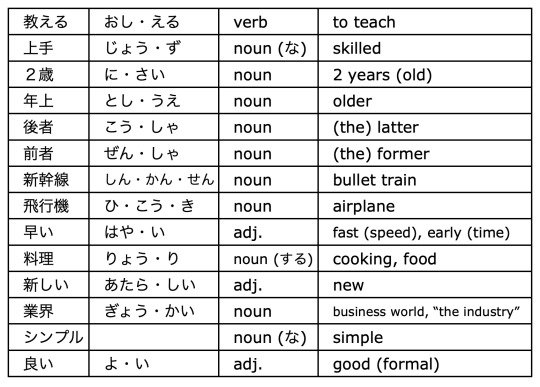
【Comparisons】
When we combine a word or phrase with より, you can think of the bundle as saying “compared to...” (sometimes though, it would be better translated as “than...”). Either way, when より is used for comparison purposes, there will always be three parts to the sentence. One pattern you may see is shown below:

The order is different compared to English, so it’s best to look at and analyze some examples first. Then after you get the order down, you can start making your own examples. Here are some to start off with:
①{彼は}{私より}{教えるのが上手だ}。
= As for him, compared to me, teaching is skilled.
= He teaches better than I do.
② {お母さんは}{お父さんより}{2歳年上だ}。
= As for my mother, compared to my father, is 2 years older.
= My mother is 2 years older than my father.
Notice that if we change the order of the translation to say the より bundle at the end, we get
“As for him, teaching is skilled...compared to me.”
We can also rearrange example 2 to get
“As for my mother, she is 2 years older... than my father.”
【The Concept of ほう】
There is another very common pattern connected to the idea of より, but first let me explain the concept of 方 (read as ほう).
Have you ever had an argument with someone that could only think in terms of black and white and no gray zone? They might tell you that Marvel is great and anything that DC does is trash. (Apparently they don’t see how underrated Man of Steel is!) That is the essence of 方. It’s a noun that means “side”, but according to 方, there are only 2 sides to any topic.
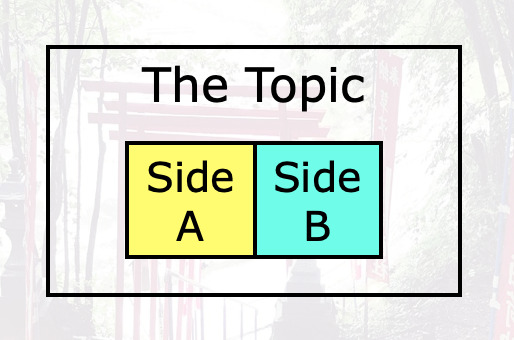
For example, if we want to compare person A and person B, one of them will get the より particle and the other will attach to 方. Here is the general pattern:

And here are some examples with 方. Keeping in mind that 方 is a noun, notice how it connects to the word that comes before it.
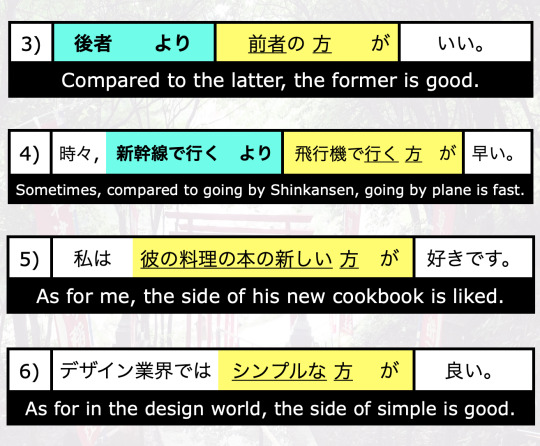
In example 3, 方 is connected to a noun by using の. In example 4 however, 行く is a verb so it can directly connect with 方. Example 5 shows 方 directly connected to an adjective. Finally example 6 shows us a noun that needs な to connect to other nouns. If you see 〜方が used to compare two things, it will be connected in one of the above 4 ways.
In examples 5 and 6, you may notice that something is missing. Where is より!?The truth is, you don’t actually need to use both より and 方 in the same sentence. If you use より, you’re saying that compared to one thing, you like something else. If you use 方, you’re breaking up the possibilities into 2 sides and saying which side you prefer. There’s really no need to use both より and 方 at the same time. They are often used together to either explain the concept to Japanese learners, or they are used when speakers really want to stress their preference. In the latter case you might see the particle も attached to より. This double particle won’t change the meaning of the sentence, but it will kind of underline and stress which side or which thing you prefer.
Also, 方 only has 2 sides, so it should be fairly easy to figure out what “the other side” is. In example 5, 方 is attached to the word for “simple” so it’s fairly easy to see that they are comparing simple with complicated (when talking about design). Even if you aren’t sure what the speaker is comparing “simple” with, you can be sure that the other side of simple is... “not simple”!
Maybe 方 makes things pretty easy to understand after all... 🧐
【To 方 or Not to 方】
Before we end things, there is a very interesting question that I found myself asking when I started listening out for and using より:
Which should I use,
{A は}{B より}〜
or
{A の方が}{B より}〜
On the surface, it may seem like they are saying the same thing but there is a difference in nuance. The [Aは Bより] pattern is talking about the topic of A. You are making a comment about it by comparing it to B. If you removed the より bundle, you’d still get a comment or statement about A.
On the other hand, the [Aの方が Bより] pattern is basically answering the question, “Which is more 〜, A or B?” Since が marks the subject of the sentence, the subject is “the side of A”. If there are only 2 sides, this inherently means “compared to the side of B.” If your listener / reader doesn’t know what the other side of the comparison is, you shouldn’t use 方が.
Speaking of the question, “which is more?” you may want to know how to ask this question in Japanese. Here are some of your choices:
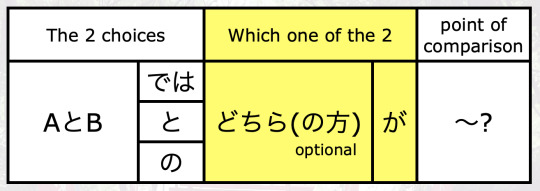
“の方” is optional when you use どちら because どちら can only mean “of the 2″. You need a different word if you want to say “out of all of them.”
【Conclusion】
The last thing I’d like to mention is that by using a より bundle, we are NOT excluding it from the description part of the sentence. For example, saying
{A は}{B より}{長い}。
doesn’t mean that B is not long. B may very well be long, but the point of the sentence is that A is longer than B. Remember, the topic is A, so we are not really talking about B. The point is just to give more information about A... we just happen to be using B to do so.
And with that I hope this post helped you understand the main function of より. You can use it to give more information about a topic by saying that the topic is to a higher degree than something else. If you strictly want to compare 2 things, you can use the pattern “方が” where the より bundle is optional.
In the next post we’ll talk about the other way to use より and how it brings our old friend から back into the conversation. As always, thanks for reading and see you next post. 😉Let me know if you have any questions!
Rice & Peace,
– AL (アル)
👋🏾
#japanese#japanese grammar#learn japanese#japanese language#japanese lesson#japanese study#studying Japanese#japanese particles#japaneselessons#learnjapanese#japanese studyblr#japanese langblr#language#languages#language study#language studyblr#language blr#日本語#日本語の勉強#にほんご
164 notes
·
View notes
Text
So, talkin abt multilingual Mams,
I was gonna make this post anyway but then I saw @cheerypining put this in the tags of my post re: Mams’ English in his character song:

I would like to hollar out a hell yes!
The thing with Mams is that he isn’t stupid. He’s smart as fuck, he’s just motivated by self interest and fixation. It’s easier for him to learn things that are of interest to him, or that expand his interests. He’s got that sweet, sweet ADD brain.
So, if language helps him spread out his influence, make money, expand his contacts? It’s gonna be that lil bit easier for him to figure out. It might even be a fixation of his. Learn a language; open opportunities in the place that language hails from. Gain an interest in how language works. Learn other languages bc it’s fun.
Consider, then, if you will, for some of that tastey lore-building,
Mams starting out learning the languages of the most influencial/opulent human powers. It’s beneficial for him to figure out how to speak their language if he really wants to get at their pockets, and you can’t really smooth talk someone if you barely understand the way their haggling works. How is anyone going to trust you if their idioms go over your head, or if you miss some slang that marks you very starkly as an outsider? It’s a lot easier if they think you’re like them; if you know the little things that’ll get them lowering their guard around you.
He’s great with dialects, too. With differences between the upper and lower classes. It only takes one slip-up using court language around the common folk, or using the dialet of the north in the south, for him to recognise how important those divisions are. He works with trust, and the eventual corruption of that trust, and it becomes pretty clear to him pretty quick that trust can only be attained the more like his target he sounds.
Dead languages still live on in Mammon’s brain. He’s fluent in them, and even though he hasn’t really had to use them in some time, for some reason they’ve just never faded away. You can pretty much use him as a way to track how languages changed over time, how regional variants were influenced by other languages or cultures, when various languages died out and what replaced them.
It’s not something that he really thinks about. It was beneficial for him, so he learnt it. Beyond that, it was fun, and he enjoyed it. He doesn’t really give himself credit for just how much linguistic history he has stored inside his head, and he really doesn’t put much credit into how goddamn useful it is - or would be - for modern historians. That’s not what he’s interested in. He’s content to leave Satan to the books, to the past; he’s got more of a propensity for the practicality, anyway.
Listening to him talk is actually pretty astounding. The ease with which he slips into each language, the depth of his understanding for even the slight nuances between regions, makes him seem like a native speaker. The speed, too, is absolutely stunning; you’ve never seen a more baffling sight than Mammon, speaking mild-mannered in Russian to a witch, switching mid-sentence into heavily-flirtatious French to order from the waitress that came to their table. It’s like he doesn’t even stumble between the two, both as natural to him as breathing.
He has his preferences, of course. When he’s not using the language for his own goals - doesn’t need to, for instance, be careful about his word choice to ensure a bond of trust is made - he quickly slips into a dialect that is most comfortable for him. He might use ‘watashi’ or ‘ore’ when he’s on the job, might tack on the ‘gozaimasu’ to his greetings to make them polite, but when he’s just generally speaking Japanese? That’s when he starts using ‘ore-sama’, when he drops all the humble or stilted phrases; uses ‘ja ne’ instead of ‘sayounara'. That’s when, in English, he stops making sure to enunciate fully; starts shortening ‘you’ to ‘ya’, cuts off the ‘g’ from ‘ing’ words, starts peppering in ‘crap’ instead of ‘stuff’, lets his words slur together to make ‘whaddaya’ out of ‘what are you’.
He’s naturally an informal guy! It’s just the way he prefers to talk. He hates the pompous lingo, even if it’s usually the most beneficial to learn for what he does. If the language he’s speaking has a way to show belligerent informality, he will absolutely use it whenever he can. It’s a choice, make no mistake; he can arguably speak better in most languages than the stupid high academics. He just doesn’t enjoy that crap when it’s not immediately useful to him.
(Yes, that does mean he can comprehend even the most pompously written academic papers. No, that doesn’t mean he wants to read them. He would much sooner stab a fork into his giblets than sit down for any period of time and read that wordy bullshit. Same goes for a lot of Satan’s literature; it’s just not enjoyable for him to read, even if he can perfectly understand it.)
Sometimes a word works better in one language than another. It can get extremely frustrating for him, if he has a very specific point to get across; unless someone knows both languages, they’re never going to fully understand. And why use five words in the inefficient language when one in the efficient language would have been even better for his intent? ‘Fernweh’ works much better than ‘imagine being homesick for a place you’ve never been’, after all.
Mams has a tendency to drop in words he likes from other languages, which makes some of his speech sound a little confusing. He doesn’t think it makes him sound smarter, and he’s not doing it to show off; just, sometimes, he thinks ‘hey’ sounds better than ‘ohayou’, or that ‘ciao’ is cooler and more aloof than ‘au revoir’. Plus, it’s kinda funny when you’re talking to someone Lucifer and you insult them in a language they don’t understand.
(I mean, in English, we literally say stuff like “it has a little je ne sais quoi,” [it has a little something that I can’t adequately express] so we merge languages into our own in order to better express ourselves. Mams does the same. He just does it with words and phrases that aren’t always naturally used together within that language.)
Do you understand the amount of skill that comes with being able to do this without even stopping to think? He somehow manages to do it in a way that makes each sentence still perfectly fluent and understandable in translation. It’s a little incredible, actually, considering he doesn’t put any stock into this ability. It’s just natural for him. Why’s he gotta think on it more than that?
(This does mean, the few times someone points it out, that he gets incredibly flustered. Especially if they say it in awe, or in praise. It really is just second nature to him, not even something he’s putting on for show or something that he’s trying to be good at, so being given so much positive attention for it is... well. It’s surprising, and a little nice, actually. But also genuinely embarrasing. It’s perhaps the only time he’ll struggle to find words in any language.)
In conclusion:
Hell yeah I love reinforcin the idea that Mams ain’t stupid and that there’s a lot of goddamn skill that comes with learnin languages and learnin them to such a degree you can accurately pepper their words into your speech without stoppin to think.
134 notes
·
View notes
Note
I saw your post about the FA's translations, and I totally agree. Sometimes, when they do not translate accurately, is to make it sound better or cooler in English, but it just ends up taking away a lot from the context and characters. We know how one of the most affected character interpretations is Katsuki's, a main character, no less. And Izuku and Katsuki's relationship too, which is something super super wrong, considering is deeply intertwined with the main plot of the series, thus if someone misinterpreted their dynamic, this person would miss a bigass chunk of the message the story has.
Here is the panel you mentioned before btw
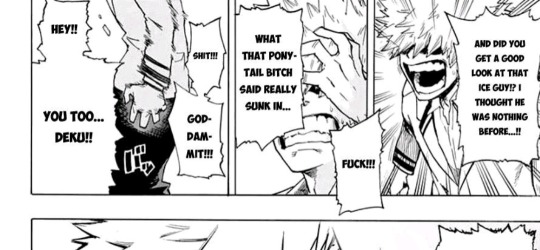
I remember when I read this, only 10 or 11 chapters into the manga (?), and I was like "...I'm...pretty sure this guy didn't say that" khshsjdhs
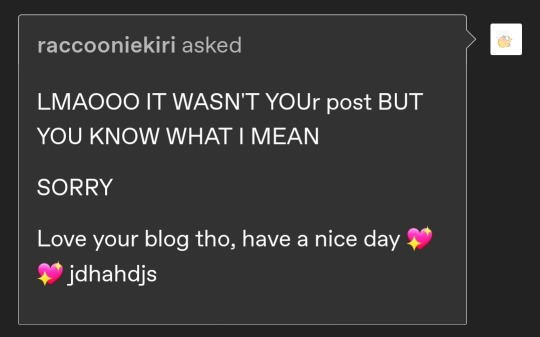
OK FIRST OF ALL LMAO HELLO MANG!! THANK YOU SO MUCH AND DW ABOUT IT I TOTALLY GET WHAT YOU MEAN !!
(this is your warning for a long post ahead!)
In any case, I still think you're very correct on this! Not to ramble a bit, but Horikoshi's particular talent in developing the plot of MHA is actually very very brilliant and there are a lot of blink-and-you'll-miss-it details that together, assemble the big picture of what MHA is.
Translations are such an integral part of being able to understand foreign media. MHA or otherwise. The simplest of details say a lot about a character and often times make or break a series because everyone knows that strong character dynamics are what carry even the shittiest of plots.
First and foremost, I want to clarify that because of the nature of fan translations and the fact that most of it is volunteer work/ written out of pure enjoyment of the manga--we shouldn't judge these fan translators too harshly (if at all) for interpreting it the way they want to. FA, as far as I can tell, is a fan-based group that works out of donations.
The first thing I wanna bring up is that when it comes to fandom and its works, there are two types: Curatorial and Transformative. Now, the transformative part is something that must be very familiar to a lot of you. Fanfiction, fanart, and most headcanons fall under Transformative Works (i.e. AO3) because they are all about transforming the canon world to fit each individual's personal preferences. Meta-analysis posts and Character Breakdowns are also classified under this.
Curatorial on the other hand are fandom interactions made with the explicit purpose of being as close to canon material as possible. This is working out the logic of quirks, for example, or memorizing as much canon content about your favorite villain as possible. These are more cold, hard undeniable facts that lend themselves to the DIRECT VISION the creator/author had while making this media. If you were to ask me my opinion on this, this would be the moment where I tell you that the Curatorial side of fandom is where fan translations should (for the most part) fall under.
What people need to know though is that oftentimes, fan translations do not.
Translating isn't and has never been a one-is-to-one process. There are hundreds of thousands of aspects in a language that make it so that it isn't perfectly translatable. Colloquialisms to sayings to dialects, to just plain-out words that don't have a proper English translation to them! Manga is made by and for a Japanese audience, so obviously in a lot of instances, there will be cultural nuances that will not be understood by anyone who hasn't immersed themselves in Japanese culture/language.
So what does this mean then for fan scanlations?
It means that a vast majority of translators teach themselves to only get the essence of the message. They take the dialogue as they understand it and translate it to something of their interpretation. When language and cultural barriers exist, translators do what they can in order to make it understandable to the general populace. This means making their own executive decisions on how they see a character speaking. In example, if they see Todoroki using very direct and impersonal Japanese--one translator might interpret it to mean that Shouto is stiff and overly formal, while another may see it as him being rude and aloof.
The problem is, translators are fans just like us.
Like with the image Mang posted above, the translator based the usage of curse words off of their understanding of Bakugou's character. The lack of foul language in the original Japanese might have made the translator think "Oh. There just aren't enough Japanese cusses for his character." And took that as an initiative to make Bakugou's lines more colorful and violent because this was working off of the image Bakugou had had at this point in canon.
But Codi! You may cry. Wasn't it proven multiple times that Bakugou prefers concise and short lines? They should've known better!
Yes. Maybe they should've known better. But tell me honestly in your first watch-through of MHA, did you perfectly understand Bakugou's character either? Did you catch the whole 'direct and no flowery language' aspect of his language when you first saw Season 2?
Most people don't. I only really understood this fact after I'd read multiple discussions of it and even double-checked the manga myself. These are the kinds of things that only become noticeable with a sharp eye and some time to scrutiny. But the fact of the matter is that when it comes to fan translations, the clout and recognition are always going to go to who can post the quickest.
Am I excusing erroneous translations? A bit, I guess. It's hard for us to go in and expect translators to catch all these errors before release when we ourselves only catch these errors like 4 months in with a hundred times more canon context than these scanlation groups did at the time of its release.
Still, there are plenty of harms that come with faulty translations.
When a translation is more divorced from the original's meaning than usual, it creates a dissonance between what is actually happening versus what the audience sees is happening. This looks like decently-written character arcs being overruled and rejected by most of the readers because of how 'jarring' and 'clumsy' it seems. By the time translators had caught on to the fact that Bakugou was more than just a ticking time bomb, we were already several steps into showing how significantly he cares for Deku.
The characters affected most by these translation errors are often those with the most subtle and well-written character arcs. A single mistake in how the source material is translated can make or break the international reception of a certain character to everyone who isn't invested enough in them to look deeper into the canon source.
It creates hiccups in plots. Things that seem out of character but really aren't. Going back to MHA in specific, the way that inaccurate translations hurt both the 'curatorial' and 'transformative' parts of the fandom is that people have begun to cite them as proof of the main cast's characterization.
Bakugou and Todoroki are undeniably some of the biggest examples of mistranslation injustices.
Katsuki, in a lot of people's minds, has yet to break out of the 'overly-aggressive rival' archetype box that people had been placing him in since Season 1. One of the most amazing aspects and biggest downfalls of Hori's writing was that at first, nearly every character fit into a very neat stereotype for Shonen Animes (Deku being the talking-no-jutsu sunshine MC, Uraraka being the overly bubbly main girl, Todoroki being the aloof and formal rival). He made the audience make assumptions about everyone's characters and then pulled the rug beneath our feet when he revealed deeper sides of them to play around within canon.
What made this part about Horikoshi's set-up so good though were the many clues we were given from the very beginning that these characters were more than what they acted like. Even from the very first chapters, for example, we learn that Katsuki (as much as he acts like a delinquent) dislikes smoking because it could get him in trouble.
That is just a single instance of MHA's use of dialogue to subtly divert our expectations of a character.
Another example is when they replaced 318's dialogue of the Second User saying that Katsuki "completes" Deku with him saying that Katsuki merely "bolsters" him. This presents a different situation, as that line was meant to reinforce the importance of those two's relationship as well as complete the character foils that MHA is partially centered around. By downplaying their developed connection, it becomes harder for the MHA manga scanlations to justify any future significance these two's words have on each other without mottling the pacing of the story.
AKA, it butchers the plot.
With every new volume, there are dozens and dozens more of these hints and bits scattered around! So many cues and subtle foreshadowing at the trajectory of everyone's character arcs--yet mistranslations or inaccurate scans make it so that we don't notice them. This is what I mean when I said that some character arcs are being done great injustices.
Until now, many people can't accept that Katsuki Bakugou cares for anyone other than himself (much less his rival and MC, Izuku Midoriya), nor can they accept that Todoroki would ever willingly work by Endeavor's side. The bottom-line then becomes that because of people missing heavy bits of characterization that become very plot-significant in the future.
When it comes to the point where people can no longer accept or fit their interpretation of the earlier manga events to what is happening in canon, the point of a translation fails completely because it has lead people to follow an entirely different story.
TL;DR - Fan scans are hard. Translating is hard. Don't get too mad at fan translations, but also maybe don't treat them as the catch-all for how characters truly operate. Thanks.
Side note: DO NOT harass FA for any of these things. FA is actually a pretty legit and okay source for scans (they've been operating since like 2014 ffs), but regardless of that they still don't deserve to get flack for their work. You can have any opinion or perspective of canon that you want, I don't care. These are just my two (more like two million tbh) cents on translations. I suggest reading takes from actual Japanese audiences tbh if you wanna know more about the source material of MHA. ¯\_(ツ)_/¯
#IM SO SORRY MANG I RLLY WENT ON A RAMBLE FOR THIS#asks#mang#bnha#mha#my hero academia#boku no hero academia
34 notes
·
View notes
Text
Golden Kamuy - Kikuta really deserved better [part 2] 277-279.
Can you tell by my title that I’m a fan of Kikuta and I have some choice words for Noda? Chapter 277 starts out with an introduction to the regional politics of Meiji era Japan. The entire political shift occurred with the marriage of convenience between Choushuu and Satsuma (the Sat-Chou alliance) and how that is playing out in government and the military. With Hanazawa on the Satsuma side a commanding officer is having Tsurumi deal with the damage control. That being Lt. General Okuda (and Kikuta’s boss)

He discloses how he’s the person who helped to cover up the scandal for Hanazawa and more of the regional politics comes into play as he pulls Tsurumi into this.
Recall that Tsurumi is from Niigata and we know he is from a family that lost power and wealth due to political changes. He assumes that of course Tsurumi would hold a grudge towards those from the Sat-Chou alliance. Usami is also from a fallen samurai family in Niigata and we know that Ogata is from Ibaraki and also from a samurai family on the losing side. Tsukishima is from the island of Sado where unwanted people were dumped in Niigata so he is also an outsider. We learn of his ‘true’ feelings as the tells his core group his opinion on things.

I love how we get unhinged Tsurumi calling it all a farce and he’s over Central. But most importantly Okuda confirmed his own intel about the gold he learned while in Russia at some point in time. His gold plan can slowly move along. So Tsurumi becomes in the Hanazawa scandal cover up looking for the young 2nd Lt. and Kikuta, working under Okuda’s direct orders.
Despite his best efforts, Kikuta’s plan is revealed by a secretary at the Military Academy, while we know that Sugimoto and Kikuta are en route to the engagement dinner.
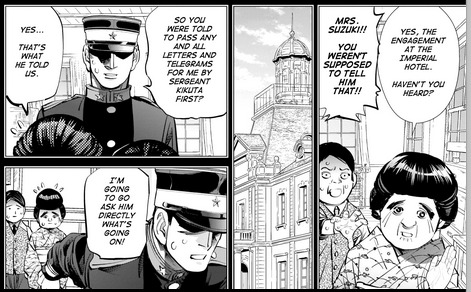
Hanazawa panics and sprints out to determine what is happening. Right on his tail is Tsurumi and his key team of Ogata, Tsukishima and Usami. Clearly this is going to become a huge mess. The next few pages are amusing, but really don’t add value to the plot. I am impressed that Kaeko has an excellent plot to get Sugimoto naked and I commend her efforts! GK is never short of strong female characters. Who enjoy sex.
This sets up a hilarious moment where he’s naked and trapped in a bedroom while she leverages the potential scandal to her advantage. By that point Tsurumi has caught up to them. What is most interesting is when Usami addresses Ogata as Hyakunnosuke and asks him what he thinks about meeting his brother. It is clear this isn’t out of concern from Usami’s part, we know he hates Ogata to his very core.
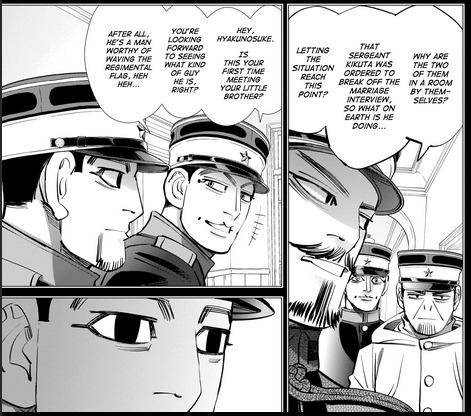
But as usual, Ogata doesn’t respond and we just see only a part of his eyes, not even a glance of his lips to give us an idea of what he’s thinking.
Kaeko and Sugimoto continue to talk as she reveals what she knows from Hanazawa Hiro. She had been a nurse during the first Sino-Japanese war so it has allowed her to reflect on the impact of war on individual soliders.
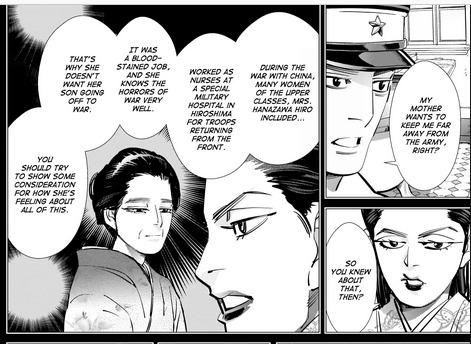
This tells us a few things; Hiro’s patriotism is more nuanced. If she were being selfish and just saying she doesn’t want her son to go off to war without experience it, that would be one thing. Instead, she knows being a military spouse first hand what happens - no one could say she didn’t do her own duty and go likely above and beyond. Ultimately, she wants to protect her son from her own experiences and observations and be a mother.
Sugimoto then realizes he needs to bail and leaves poor Kikuta confused. And then bam! The 27th is there.

Of course this leads to the most Sugimoto situation of all time! Tsurumi threatens Kaeko with his handgun and Ogata asks where Yuusaku is. Of course Sugimoto flies out of the bathroom naked sans Kikuta’s hat and Ogata is just amused beyond belief.
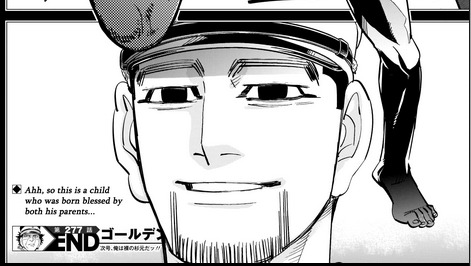
This would be complete if he were relaxed eating a box of popcorn or something like that. 278 continues this absolute chaos and lots of fan service for Miss Kaeko! I really don’t think the fight scene needs much meta. Ogata just finds it amusing (and btw sucks at hand to hand combat) while Usami rumbles with Sugimoto. Tsurumi realizes he’s not Yuusaku and Kikuta rushes in and gets shot in the shoulder by Tsukishima.
Somehow, Kikuta is able to get the rest of them to flee but not without running into the actual Hanazawa Yuusaku. Awkward. Tsurumi only then realizes that Kikuta was doing his job and they run out into the street.
Kaeko tries her best to convince Sugimoto to marry her. Granted he is a very heroic figure and he fought to protect her. However, reality wouldn’t allow that to happen and Sugimoto decides to join the army - thinking he won’t starve that way.

Kikuta looks so sad and disappointed when he hears this.

He’s definitely thinking of his younger brother who died b/c he told him to join the army with him. I loved the fact that we learn that Kaeko got to be a successful woman who was also compassionate to others.
There is a quick exchange that shows the first encounter between Ogata and Yuusaku. Yuusaku notices Ogata and salutes him as a cadet.

Ogata doesn’t even return the salute and he look he gives him out of the corner of his eyes. What is he thinking? I’d say Yuusaku doesn’t know who Ogata even is. But something has him very suspicious to be this leery of him. This also makes me think of this previous encounter between Koito and Ogata in chapter 200.

This time Ogata is bolder when he walks by Koito who is also currently still in the Army Academy. Except unlike Yuusaku who doesn’t seem to pick up on Ogata’s vibes, Koito does! And the two of them stare each other down. I think that this in part shows that Koito has more innate awareness of things and could be considered more of a ‘natural’ in the military. Which Yuusaku isn’t. We have no evidence Yuusaku has any sort of military talent or skills.
The chapter ends with Kikuta asking Sugimoto if he’s serious about joining the military and how he’s already fated to go to hell based on what he’s done in his life. 279 continues the conversation between Kikuta and Sugimoto and he flat out tells Sugimoto about how his brother died of illness in the army during the Sino-Japanese war.
Sugimoto then becomes Kikuta’s younger brother telling him that it is time to move on. This continues the trend in GK where a character that is speaking becomes someone else to the listener.

This is most evident with Asirpa when she becomes Yuusaku on more than one occasion to Ogata.
But this facial expression from Kikuta [sobs].

No wonder Kikuta worked so hard to save Ariko’s life! He can’t just always be responsible for the deaths of others.
Sugimoto convinces Kikuta that he’ll be alright in the army and he relents and lets him keep the cap. This shows that Kikuta has moved on from the death of his brother - a big deal! In an unusual way, Sugimoto has helped Kikuta move on and take the next step in the healing process.
Kikuta reports to his commander in the 1st. Okuda wants him to keep an eye on Tsurumi. Obviously, he knows now that Tsurumi interfered with Kikuta’s plans for Hanazawa rather heavy-handedly so he would need someone else to balance it out.
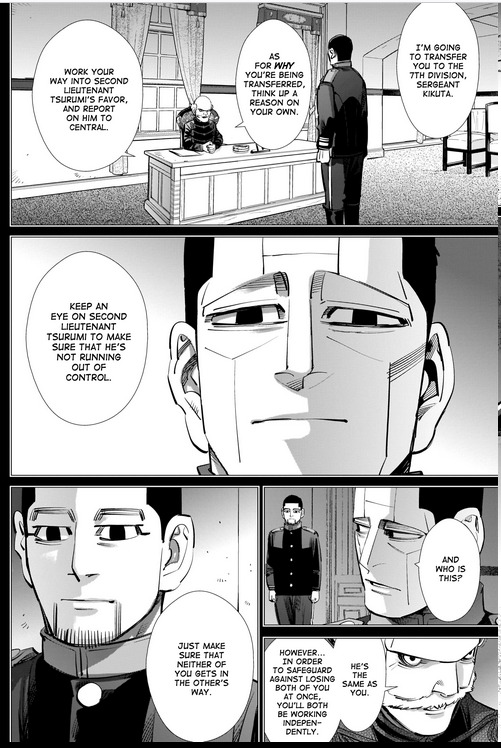
It then reveals that Ogata is also working for Okuda in the 1st. This explains why when the two of them crossed paths in the brewery they did not engage but nor did they appear to exchange any information.
I can’t help but feel like something is still off with this. Ogata does have skills from working in intelligence with Tsurumi. He’s observant, makes himself invisible and can get others to talk easily. But Ogata being a 100% willing spy - it seems like he wants something else out of this. Kikuta’s character screams secret agent - but Ogata, he’s something else. I’m not sure if Ogata’s choice to be a spy on Tsurumi was a real choice.
When Ogata and Tsukishima had their shoot out in Yubari at Edogai’s, Tsukishima told him he was a pet cat for Central. Ogata replied that they were part of a rebel element. We know that Ogata was working with Tamai at the beginning of the manga. I struggle to see how Ogata has loyalty to anyone honestly. He seems to be moving throughout this game with again his own mysterious objective. Ogata is cynical and has no belief in the nation state nor does he harbor any sort of deep patriotism towards Imperial Japan.
Since Okuda is friends with Hanazawa and is based in Tokyo, he may have known Ogata since his birth and has kept tabs on him after the Ogata grandparents took him back to Ibaraki with his mom. Ogata’s existence might be a sort of trump card that Okuda is keeping . . . but others found out as well like Tsurumi. Did Okuda have Ogata tell or leak information that Ogata is Hanazawa’s first son?
The chapter jumps to the 203 meter hill in the war and we see Yuusaku fallen on the battlefield. Ogata watches from distance, his face cut off while other members of the 27th run out to help Yuusaku.

This finally reveals Yuusaku’s eyes! Not the anticipated reveal - I kept thinking this was something that Ogata was going to see but it shows us clear eyes. Which look sort of similar to Asirpa’s eyes.
So many thoughts are jumping around in my brain about this reveal.
1.) These eyes are not the ‘trademark’ Hanazawa eyes. Dark black orbs with those eyebrows! This indicates his eyes aren’t from his father.
Seeing this, I can’t help but think that Yuusaku is not Hanazawa’s son. Instead, Hiro had an affair with someone else. A major theme in GK is that the children inherit the skills of their parents. Asirpa is able to do many things as she inherited the intelligence of Wilk. And that Ogata is the true inheritor of Hanazawa’s military skills.
Recall this from chapter 58. Ogata leads the crappy local gang against Hijikata and acts like a commander.
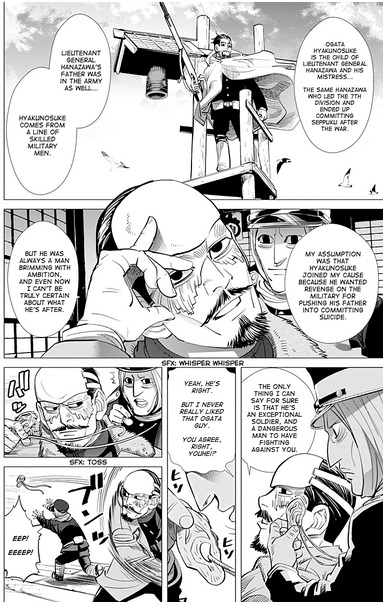
We know that Tsurumi’s lie about Ogata wanting to avenge Hanazawa is to keep Nikaido in the dark.
This would also explain why everything we learn about Yuusaku is terrible at military things. If he also isn’t Hanazawa’s son it would make it even more reason for Hiro to try to prevent him from entering the military since he’s not even genetically related to this great line of Hanazawas.
I wish we knew more about the Ogata side of things - I think we’ll also learn that the Ogata side had competent military men on it as well.
2.) Yuusaku’s eyes are the same as Asirpa’s and indicate their sort of innocence. In this case, it would perfectly explain why Ogata sees Yuusaku instead of Asirpa when he has the fever and then the melt down on the ice floe. Yuusaku kept himself naive and innocent to meet his father’s expectations. A man who I don’t think is even his father at this moment.
Therefore, Ogata’s guilt on killing Yuusaku is tied to his sort of innocence in these situations and why he can’t seem to shake his mental confusion when it comes to Asirpa. However, unlike Yuusaku, Asirpa has never forced herself on him to do things or guilt tripped him so it leaves things open for him to not link her to Yuusaku.
3.) Yuusaku was going to blow Ogata’s cover working for Okuda. Now that we know that Ogata was working for Okuda while in the 27th it means he’d have to keep his role quiet. If Yuusaku found out that Ogata was working for Okuda, I could see him going to Tsurumi and telling him this information. Therefore, to protect his status, Ogata used this as his rationale to kill Yuusaku on the battle field. I have never figured out if Ogata was nudged to kill Tsurumi by his ‘don’t kill him right now.’ comment as one of Tsurumi’s backwards motivations that lead Ogata to directly killing him.
So many possibilities! I want more Ogata backstory dammit!
Anyhoo, to not make this meta super long let’s get back to the action.
Asirpa begins working out how to try to break the code. Hijikata notes that Wilk could have used something other than kanji, since he’d know the Latin alphabet for Polish and Cyrillic for Russian. Shiraishi makes a clear point that this could be a message from Wilk towards her, though it feels like he’s channeling Kiro. Out of many of the Japanese characters Shiraishi time and time again comes out much more sympathetic to the minorities than others.
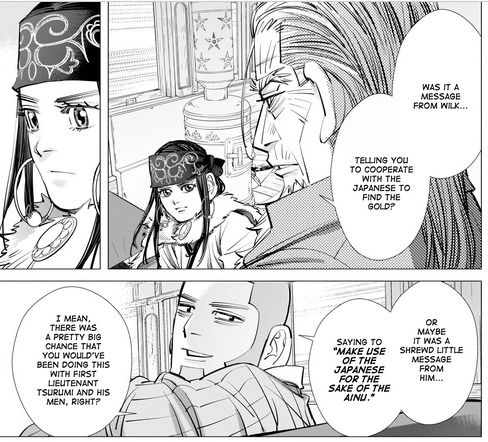
Asirpa begins to wonder how the coin is linked to the skins. She’s thinking things through and is on her way to solving the puzzle.
After saving Ariko, Kikuta is returning to Tsurumi’s group in the church. Oh Roger, this is why I love you so much.
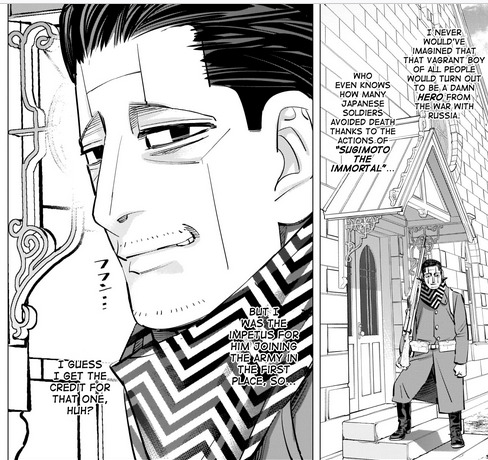
Look at that smirk with a slightly watery eye. At the same time Tsurumi is also looking at the coin and realizes he’s figured it out.
Kikuta approaches the rest of the group and comments on if he’s found the location. Tsurumi states that things are just getting started. He casually pulls out his gun and fires two shots into Kikuta at point blank range.

And with this I am deeply saddened and shocked. How dare you do that to Kikuta!!! He was my Kiro replacement and now he’s also going to die.
First Boutarou died and now Kikuta. [cries]. We know that Tsurumi is a shinigami but this is just brutal. The bear death trio died early on in the manga. Ogata escaped. Kikuta now is the next link to Central that goes down.
#golden kamuy#Golden Kamuy manga#golden kamuy meta#warrant officer kikuta#sugimoto saichi#asirpa#tsurumi tokushirou#Usami Tokishige#Hanazawa Yuusaku#Hanazawa Hiro#hanazawakoujiro#koito otonoshin#okuda#ogata hyakunosuke#tsukishima hajime#wilk#hijikata toshizo#Kaneko Kaeko#okuda hidenobu
36 notes
·
View notes
Note
Film, like everything else, is very subjective, so with not knowing where your tastes lie, I am just going to throw some random favourites of mine out there to you, which you may or may not have seen or heard of... all of which, I feel, have a dreamy surreality to them, even if only in part...
- Brazil (1985)
- Das Cabinet des Dr. Caligari (1920)
- Les Diaboliques (1955)
- Eraserhead (1977)
- Eyes Without a Face (1960)
- Hausu (1977)
- The Hourglass Sanatorium (1973)
- The Innocents (1961)
- Last Year at Marienbad (1961)
- Picnic at Hanging Rock (1975)
- Possession (1981)
- Santa Sangre (1989)
- Valerie and Her Week of Wonders (1970)
- Videodrome (1983)
I've tried to avoid anything ultra obscure... hopefully you find something there that resonates with you... : )
Brazil (1985)
I am not too familiar with this film. I just know there’s a scene where a woman’s face is being stretched as she is looking into the mirror and all I can wonder is if Terry Gilliam was a fan and inspired by Spielberg’s Poltergeist (1982).
Das Cabinet des Dr. Caligari (1920)
I am familiar with the visuals of this one and really love them. I feel that if Edvard Munch and Edgar Allan Poe were alive to direct a film, this would have been the result. And it appears as though Gustave Doré and Pablo Picasso were hired to do production and editing. In other words, a masterpiece of artistic skill.
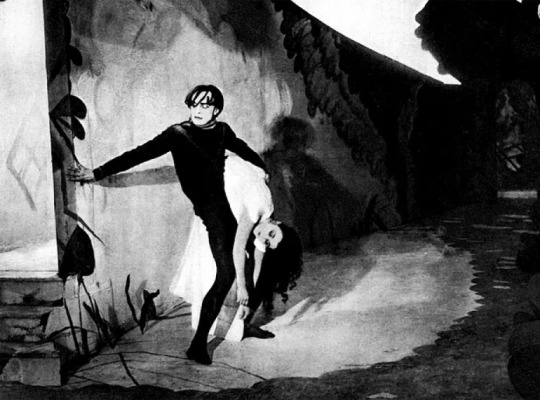
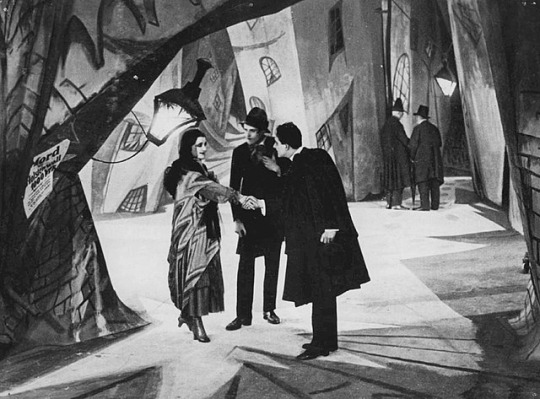
Les Diaboliques (1955)
I do not know this one, but it looks like a film I would enjoy. I love the classic black and white genre. I find it appealing that it has Simone Signoret and Paul Meurisse, too. I may look into it later when I find ability to do so.
Eraserhead (1977)
I usually love David Lynch and it is very stylized, which I admire; however, it has some visuals I could not handle sitting through. I do not mind things being strange, but there is a line and this one likes leaping over it a bit too much for my entertainment.
Eyes Without A Face (1960)
Another one I’m not interested in watching, however, it did inspire a great Billy Idol track. Honestly, Rebel Yell in it’s entirety is a damn good album.
Hausu (1977)
I enjoy it. I have a weakness for the Japanese Horror genre. It has nuance, depth, creativity and style that is usually very lacking in many purely American Horror films. I particularly love films The Ring (2002) and Shutter (2008). I feel there’s always a great spiritual, supernatural and/or psychological element to their films that is unique and hard to compare to anything else. Japanese Horror really knows how to balance beauty with terror in a way that doesn’t feel empty or superficial.

Here are a couple of visuals from the two films I particularly enjoy and mentioned aside from Hausu (translation for other people: House):
The Ring (2002) directed by Gore Verbinski
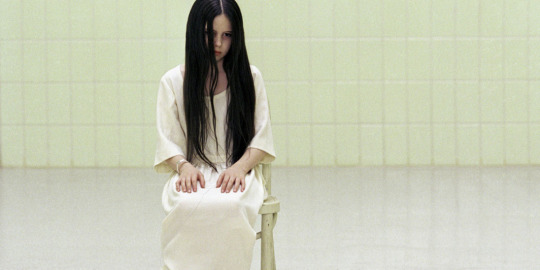
Shutter (2008) directed by Masayuki Ochiai
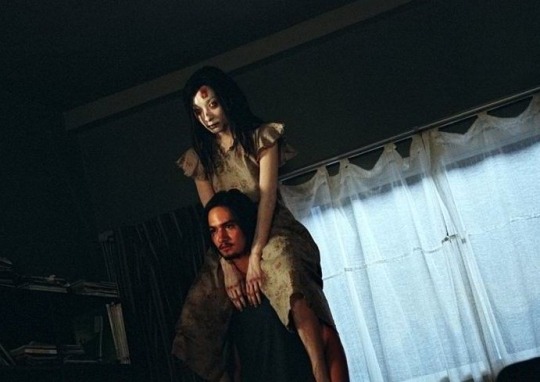
The Hourglass Sanatorium (1973)
I remember watching this film when I was a lot younger. It’s very surreal and atmospheric. It feels like a feverish dream and painting all at once. Every time feels like watching it for the first time, because there are so many intricate and lovely details I might have missed before. It’s hard to take in everything completely at once. It’s a wonderful escape from reality.
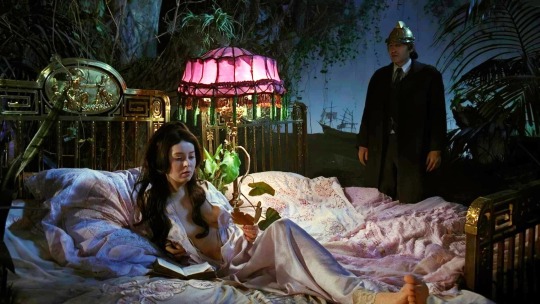
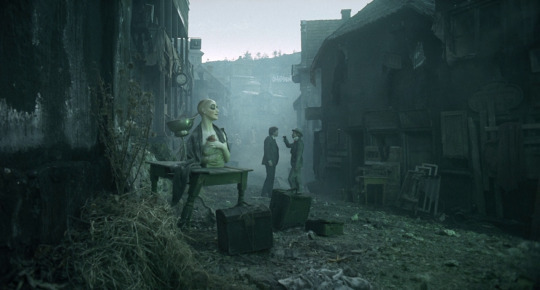
The Innocents (1961)


An exquisite film. Classic. I wish I could live in this world. This era is everything to me. Just the costumes alone are breathtaking to me. I would not mind being the Governess for even a day. She’s such a beauty. And you know anything adapted by Henry James has to be a treat.
Last Year At Marienbad (1961)
I do not know this one! It feels like a crime. I have to add it to my list of growing films I need to see. It looks so glamorous and romantic. I am not sure if that’s the intention, but that’s how it appears so far to me.
Picnic At Hanging Rock (1975)
Ok, this one I am familiar with. A dreamy mystery with a special soundtrack. I do not know why, but the soundtrack invokes similar feelings of escapism in me that the Legend Tangerine Dream soundtrack does.
Possession (1981)
I have not seen this one. I am only familiar with The Possession (2012) which is not the same plot. I will have to look into this next. I can not say if I will enjoy this or not. When it comes to films that involve spiritual possession, I am a very tough critic to please.
Santa Sangre (1981)
It looks like a film that took concepts from Rocky Horror Picture Show and said “how can we make this even stranger” and did it. I love the music of Rocky Horror, but honestly if it wasn’t for Tim Curry I wouldn’t care for that movie, either. Tim Curry is one of those rare actors that could make a dumpster fire fun.
Valerie And Her Week Of Wonders (1970)
Let’s be honest, to not know this movie you have to have been living under a very big rock. It’s iconic.

Videodrome (1983)
I think I started to watch this once when I was a teen and promptly decided to forget what I saw. I think I did a good job. Not saying it doesn’t have some interesting visuals, but lord. Will I watch it ever again? That’s a no.
29 notes
·
View notes